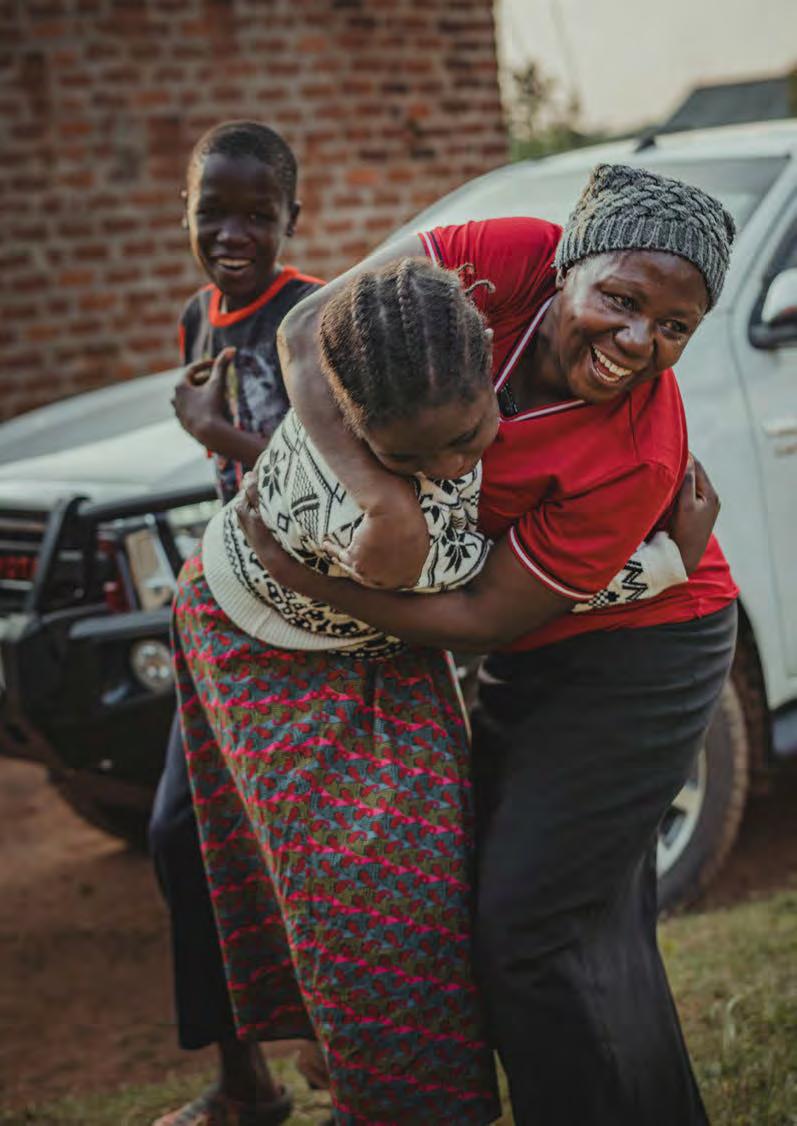
2023 www.hopeforjustice.org
I am incredibly proud that the work of Hope for Justice reached more people than ever before this year, and there is no doubt that our efforts are needed more than ever.
There are over 200,000 people whose lives have been touched in some way by our work in just 12 months. Among them: a young girl, sold by her family and trafficked for sex but now safe at our Lighthouse; a male survivor of forced labour who finally feels stable and supported enough to give evidence against his abusers; a police officer whose understanding of modern slavery was very shallow, until our specialist training; a mother in a poor, rural village who had been close to believing a broker’s promises about a ‘good job’ for her children, until she attended one of our community trafficking prevention initiatives and realised that instead her children would almost certainly be sold into brothels, street-begging or domestic servitude; a teenage boy who thought he had made a friend on a gaming app, but the person behind the profile was 30 years older and a convicted kidnapper. I could go on, with 200,000 more examples.

Our work reached all these people at a time when we have been seeing the continuing fallout from Russia’s invasion of Ukraine and the associated crisis of displaced, vulnerable people and the gangs targeting them. The after-effects of the Covid pandemic and the lockdowns continued to have an impact, especially in certain countries where we work. We have had to adapt some of our programmes because of the impact of rising costs, financial pressures on donors, and shifting strategic priorities. This has been difficult: we are seeing urgent need, and we want to be expanding our programmes to meet that need.
Around the world, there have been some real positives in terms of public, government and business awareness and action on this issue. Significant legislation was passed and came into force in multiple countries targeting forced labour in supply chains. Many more businesses became members or clients of Slave-Free Alliance, our social enterprise that stands alongside organisations to help them mitigate risks and protect their supply chains, which ultimately protects vulnerable workers from being trafficked and exploited.
CONTENTS Foreword from the CEO Where We Work How We Work Our Impact in Numbers, 2022-23 Ukraine Crisis: Survivor Story Updates from our UK and Global Programmes Training and Learning Academy Survivor Story Policy and Reforming Society Hope for Justice in the Media and in the Community Slave-Free Alliance Closing Statement from our Chair 01 02 04 06 08 09 18 20 21 24 33 40 Names of victims and survivors have been changed throughout this document for their safety and privacy
I am inspired every day by the team of staff and volunteers at Hope for Justice who are reaching so many people and helping them to find freedom. I want to say a massive thank you to all the individuals, businesses, churches and community groups who have given so generously in support of this vital work. Among them are organisations that have funded specific parts of our programmes around the world this year, including the Global Fund to End Modern Slavery, Young Living Foundation, Modern Slavery Innovation Fund, UNICEF and many others.
Ending human trafficking for good will take more than one organisation, it is going to take us all, coming together with a single purpose and with a tenacious belief that change is possible. Thank you for being with us as we take each step towards realising our vision: a world free from slavery.
Tim Nelson CEO, Hope for Justice

If you have any questions or think you can partner with us in any way, I would be delighted to hear from you. You can reach me at tim.nelson@hopeforjustice.org
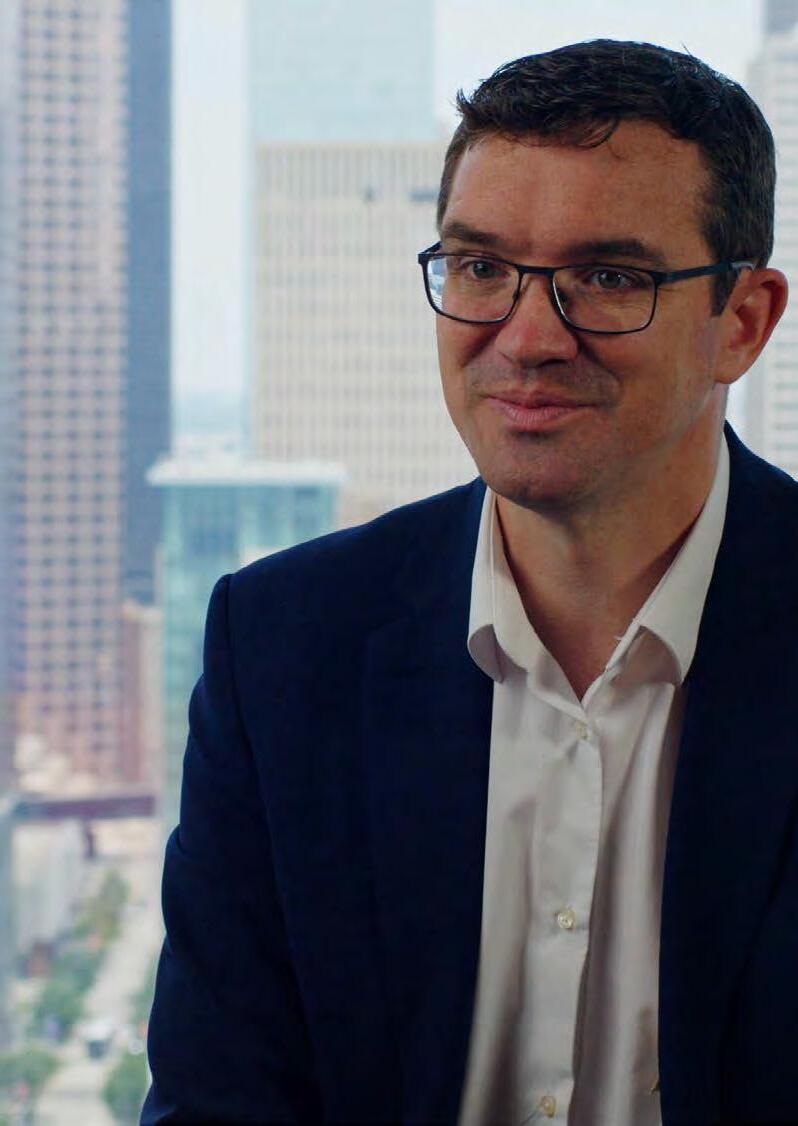
01
Annual Review 02
Hope for Justice’s work in Cambodia came to an end in mid-2023.
Iowa UK Tennessee Florida*** Norway* North Carolina Washington,D.C.**
WHERE WE WORK
Colorado***
*Slave-Free Alliance and operational support only
**Via a partner
***Operational support only
Hope for Justice has a staff of approximately 350 people around the world delivering life-changing anti-trafficking work.
Annual Review 03
Ethiopia
Uganda
Moldova**
Cambodia
Australia*
Outreach
Our specialist teams engage with vulnerable adults and children in the community. We help children and teenagers out of dangerous and vulnerable circumstances, such as living alone on the streets, and encourage them to join our Lighthouse centres for safe shelter, counselling, educational opportunities, fun activities and eventually, reintegration or transition to independent living. Just under half of all children at our Lighthouses come via outreach work, the rest via referrals from police and other agencies. With adults, our teams use community engagement, cultural knowledge and language skills to connect with vulnerable populations and individuals, or begin the process of a rescue out of exploitation. We also run trafficking prevention initiatives.
Rescue
Many of our countries host specialist Hubs and Regional Centres staffed by experienced investigators and/or multilingual community engagement specialists. Our rescue work comprises all the activities and services that Hope for Justice provides directly and indirectly to victims and survivors of trafficking, to support them at the beginning of their journey towards their preferred outcome of recovery and safety. This is unique to the individual, but commonly will focus on activities including:
1) identification as a victim (through outreach, community engagement, awareness-raising, training, investigations and referrals);
2) an exit from a situation of exploitation or vulnerability, whether through physical removal (where this is appropriate, and usually alongside law enforcement), placement into a temporary shelter or supported housing, or entry into our Lighthouse programme. We also act as an alternative pathway out of exploitation for victims too scared to engage directly with police;
HOW WE WORK
3) getting to an initial position of stability (physically and mentally) to continue their journey of recovery.
Intelligence gathered about traffickers and gangs is shared with law enforcement – many perpetrators have been convicted and put behind bars with our assistance.
Training
We offer accredited training to people and organisations who may come into contact with victims and survivors of modern slavery. We offer short basic awareness training as well as longer, in-depth courses on modern slavery for practitioners and professionals.
Our training is particularly relevant for anyone involved in policing and law enforcement; central or local government; healthcare and social work; or non-governmental work in the community, such as food banks, drop-in centres, community organisations and outreach, and those working with vulnerable people.
Transitional care – children (Lighthouses)
Our Lighthouses provide temporary care and support for vulnerable and exploited children, keeping them safe from the dangers of the streets or their previous circumstances as we work to assess their physical, mental and emotional health and their circumstances.
Our Lighthouses also offer individual and group counselling and are complemented by our Shine Schools, where children receive catch-up education and life skills training. Older children and teenagers also get help with vocational training to develop skills for employment.
Family reintegration –children (Lighthouses)
While children are being cared for at our Lighthouses, we work to trace their families when possible, and consider how best to safely return them back to their families or to family-based care. We support families to prevent children separating from them again.
Reintegration to biological or extended families is only considered when they are able to provide safe care and where any risk of re-trafficking or re-exploitation is low, as assessed by our case managers.
The child must be an active participant in the decision. Where family reintegration is unsafe or impossible, other options include specialised long-time care with another agency or independent living combined with vocational and business skills training.
Annual Review 04
Community prevention
Our community prevention programmes are focused in Uganda and Ethiopia. They are designed to strengthen families, communities and systems to prevent children separating from their families and from being trafficked, exploited or enslaved. They tackle root causes, such as poverty, family stress, peer pressure on children to abandon their families to seek new opportunities, and attitudes viewing children as economic assets. The programmes consist of:
• Self-Help Groups: A fixed group of participants (usually women) who meet weekly and are financially and socially empowered through pooled savings and loans, training in effective parenting, child protection, anti-trafficking, and other skills. A variation on this approach is the fixed-term Village Savings and Loans Associations (VSLAs) for areas where populations move around a lot, such as urban slums.
• Child Protection Clubs (typically in schools) and Hubs (typically in urban slums): Students or children meet weekly, supervised by a volunteer mentor, to learn about children’s rights and the dangers of trafficking and unsafe migration. The students or children then educate others through school and community events. The Hubs are safe spaces for study, play and support for children in or out of formal education.
• Community Awareness Raising: Mass media campaigns and training for community leaders, to reduce the risk of trafficking and exploitation.
• Child Protection Committees: Key stakeholders such as government officials, police, schools, community and religious groups working together to better protect children and ensure reports of abuse are followed up and acted on.
• Youth Training: Small business skills training and/or apprenticeship training to create opportunity and reduce vulnerability.
• Community Conversations: Structured discussions between groups of people affected by complex community problems in Ethiopia specifically. For example, we bring together domestic workers, employers, brokers and community leaders to discuss complex shared issues of exploitation, human rights and unsafe migration, and agree changes that benefit all.
Reform
Our direct work with victims and survivors informs Hope for Justice and Slave-Free Alliance’s work on national and international policy reform and legislative engagement, creating long-term sustainable frameworks for an anti-slavery ecosystem. You can read more about our Reform work on pages 21-23.
Safe aftercare – adults
In North Carolina, we are providing holistic, trauma-informed aftercare for survivors through our new RISE Program (Restore, Inspire, Strengthen, and Empower): an integrated suite of services that contributes to the sustainable improvement of the wellbeing, safety, and self-sufficiency of survivors.
We do this through trauma-informed care and support, community engagement, clinical therapy and comprehensive individualised case management, including connecting survivors to services in the local community. We walk alongside them each step of the way, advocating on their behalf and guiding them through the social services and legal systems.
Advocacy – adults
Hope for Justice has provided independent advocacy in the UK for more than 10 years, taking a holistic approach and responding to survivors’ requests for a single point of trust, to advocate for them in navigating and understanding the complex systems that they transition through during the process of recovery.
Our multi-disciplinary Independent Modern Slavery Advocates (IMSAs) help survivors to access housing, financial support, good-quality employment opportunities, psychological help, legal advice and more. We guide them through the criminal and civil justice processes and ensure their voice is heard to shape their own future.
We also provide an Advocacy Advice Service for professionals at other organisations. Our IMSA Model Development Project will provide an accredited framework that can be used by other organisations to deliver a standardised IMSA service throughout the UK.
Hope for Justice, The Snowdrop Project and British Red Cross, together with consultants with lived experience of modern slavery, are leading this collaborative effort. Read more on page 16.
Monitoring and Evaluation
In our projects, we work both directly (e.g. oneon-one service provision) and indirectly (e.g. community-based events with limited direct intervention). We typically serve 20-30% of beneficiaries directly, and 70-80% indirectly.
Our MEAL (monitoring, evaluation, accountability, and learning) function uses programme or project planning, data collection, collation and analysis to understand programme effectiveness and impact while ensuring accountability to beneficiaries, funders and other stakeholders. It also generates learning for organisational use.
Our MEAL function generates and verifies the impact statistics that you can find over the page.
Annual Review 05
OUR IMPACT: THIS YEAR’S ACHIEVEMENTS
203,352
women,
This is our largest reach figure in our history, and the first time we have managed to reach more than 200,000 people.
A higher proportion of our reach figure this year compared to last year was direct service provision to beneficiaries, at 25% of people reached, up from 21% last year.
Examples of direct reach include people directly rescued from modern slavery or helped through aftercare, professionals given intensive training and people participating in our Self-Help Groups.

Indirect reach means family members of our beneficiaries who indirectly benefitted from our work, those attending community antitrafficking awareness and education events, and those reached through online and virtual outreach sessions.
Note: All statistics on this page refer to the period April 1st 2022 to March 31st 2023.
This year, our work reached men,
boys & girls.
1,658 children
served at our Lighthouses, 759 girls and 899 boys
1,474 children and teenagers
reintegrated with their families or assisted into independent living
12,174 people
participated in one of our Self-Help Groups
609 groups currently active 12,183 people 133,925 people 188 victims 78 survivors
2,106 beneficiaries
11,373 people 119 members
with 12 new groups established this year
trained globally via 293 training sessions
reached through community education and awareness sessions, child wellbeing clubs, community conversations, and child protection committees
of modern slavery or human trafficking removed from their situation of exploitation (either direct or assisted)
supported by our Independent Modern Slavery Advocates (IMSAs), plus 17 family members and dependents
received our most intensive one-on-one service provision, at Lighthouse shelters, from our Hub / Regional Centre teams, or our IMSAs
engaged through outreach services globally, including potential victims of trafficking and those most vulnerable to it
of Slave-Free Alliance, including 14 FTSE 100 businesses
Annual Review 07
A Ukrainian woman who fled the war to find safety in the UK was instead trafficked for sexual exploitation by the man who sponsored her. Galyna* had met him on a dating website a few years before the Russian invasion, and thought she could trust him after having chatted with him over that time. When the war started, he messaged her and offered to be her sponsor and to set her up with a job.
But when she arrived in the UK, needing help, he instead used his power over her as her sponsor under the visa scheme to try to exploit her. Over the course of a frightening, stressful few weeks, he had her constantly moved around between properties and hotels, getting him to work for his business for free, while pressuring her for sex.
She was hungry, confused and shocked at the behaviour of this man she thought she knew. It turned out that not only was he married, he also boasted of his exploitative relationships with multiple other women.
When it became clear she was not going to agree to his demands, the man had her dropped off at a council building, washing his hands of her because he could not control her as he had wanted.
Later, a local charity helping homeless people spotted the signs of trafficking and put her in contact with Hope for Justice.
Ukrainian woman now safe after sponsor tried to traffic her UKRAINE CRISIS UPDATE
Our team gained her trust and Galyna shared her story, and agreed to enter the National Referral Mechanism (NRM), the UK’s system for identifying and giving safe-house support to potential victims. Hope for Justice assisted her with all her basic needs and helped her find somewhere better to live, and to access vouchers provided by the British Red Cross for Ukrainians in the UK.
Our support worker said: “She was really grateful for this support, that we were there to help her and guide her. She said she would have been lost in this country without Hope for Justice. Galyna wants to share her story and for other people to know this is happening, because she knows there are other people out there being exploited and controlled by their sponsors.”
Galyna is today doing well and living in far better circumstances. She said: “Thank you for helping Ukrainians and everyone who needs help.”
Wider response to Ukraine crisis
We have been part of the anti-trafficking response to the Ukraine crisis ever since Russia launched its invasion. During 2022-23:
• We created multilingual resources for those fleeing the conflict, and those likely to come into contact with them.
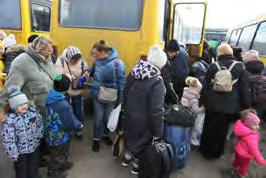
• We jointly launched a website called ‘Ukrainians Welcome – Stay Safe in the UK’.
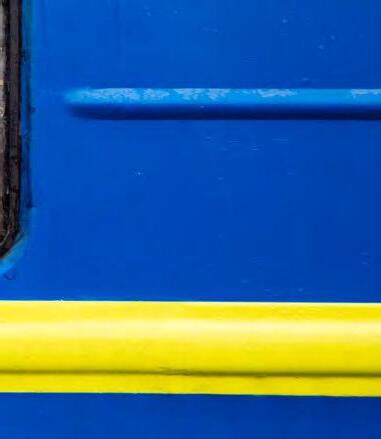
We convened 70+ anti-trafficking organisations to sign a letter condemning the invasion and showing how conflict feeds human trafficking.
We jointly wrote to the largest mobile networks urging them to send a simple anti-trafficking safety advice text to Ukrainians the moment they arrive in the UK and switch on their phones. Ukraine’s two biggest networks, Vodafone and Kyivstar, agreed to do so.
We worked to ensure Ukrainians placed under the UK Government’s Homes for Ukraine initiative (or any other channel) were not at risk of being exploited, and to ensure those affected by modern slavery got support.
08
LAUNCH OF OUR R.I.S.E. PROGRAM
IN NORTH CAROLINA
We are establishing a network of Regional Centres across the United States to expand our reach – helping more victims, deepening our impact on survivors, and creating resilient communities where survivors thrive.
In North Carolina, during 2022-23 we have been developing a Regional Centre with a holistic approach as part of a comprehensive strategy in the fight against human trafficking. Based on our four pillars of preventing exploitation, rescuing victims, restoring lives, and reforming society, we are providing a holistic, trauma-informed approach to bring hope and justice to survivors of human trafficking in North Carolina.
We are calling this newest part of our model the RISE Program (Restore, Inspire, Strengthen, and Empower): an integrated suite of services that contributes to the sustainable improvement of the wellbeing, safety, and self-sufficiency of survivors through trauma-informed care and support, community engagement and comprehensive case management. This is delivered by a team of experts:
• Investigators: With years of law enforcement experience, our investigators determine if a case meets the definition required by law to charge someone with the human trafficking statute. Investigators help identify victims, gather intelligence about suspected traffickers, and share that information with law enforcement to aid in victim rescue.
• Outreach Specialists and Trainers: Our experienced outreach specialists and trainers identify target audiences for training, develop curricula and provide high-quality training. They also conduct outreach with populations vulnerable to trafficking and industries that intersect with trafficking victims. We equip those we train with the knowledge, skills and tools to identify modern-day slavery themselves and respond effectively.
• Case Manager: With a community-based approach to aftercare, we help survivors of trafficking rebuild their lives by providing individualised case management and connecting them to services in the local community. We walk alongside them each step of the way, advocating on their behalf and guiding them through the social services and legal systems.
• Clinical Therapists: Developing a care plan that is unique for each survivor, our counselling services allow for different forms of therapy to meet individual needs, which positions the survivor for success and healing.
• Sector Experts: With years of experience working to tackle human trafficking on a global scale, Hope for Justice Regional Centre leaders bring a unique perspective, applying their broad knowledge to a local context, addressing policies, and catalysing change.
We will evaluate the model’s success in North Carolina, and its outcomes for survivors, and we hope to then roll out this model or a version of it to our other U.S. locations, and any future Regional Centres we are able to launch.
Above: Our Regional Centre for North Carolina is based in the city of Charlotte

Traffickers identified in 8-month cold case
Hope for Justice intervened in a cold sex trafficking case, successfully identifying the traffickers and making a federal prosecution possible.
A survivor of trafficking and her child came to our team in North Carolina seeking assistance to find a place to live. Through detailed interviews, our investigators discovered that although her experiences had been reported to police in her home state, her traffickers had never actually been identified nor prosecuted for their crimes.
Our investigators got to work. Through indepth intelligence gathering and surveillance, we managed to identify both traffickers. Our evidence was passed to a federal agency, and we are continuing to collaborate to ensure those responsible are brought to justice. We suspect the two people identified could lead us to a wider organised network.
Our investigator on the case said: “The traffickers would have never been identified and this case would not have had the attention of federal law enforcement if we had not pushed deeper into this and utilised open-source intelligence. Prior to our North Carolina team’s findings, the case had been sitting cold for eight months.”
Annual Review 09
In January 2023, Hope for Justice’s Deborah Lighthouse – a centre supporting young girl survivors of trafficking and slavery in Ethiopia – marked an important milestone when it celebrated serving its 1,000th survivor.
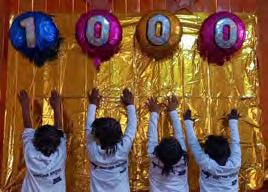
Dereje Zeleke, Hope for Justice’s Ethiopia Country Director, said: “We are emboldened by the reach of our Deborah Lighthouse and the collaborative work we have performed with these 1,000 young girls. They are so much more than a number on a spreadsheet: each is a life worthy of dignity, respect, and humane treatment. We will continue to provide empathic and empowering support to those deserving of so much more.”
Established seven years ago in Addis Ababa, the country’s capital, Deborah Lighthouse provides refuge, rehabilitative support, and reunification efforts to girls aged 7-18 years old. The circumstances of its 1,000th survivor are typical of those referred to the centre or encouraged to join by our outreach workers.
The survivor is Sagal*, a young girl from rural Ethiopia. Her single mother was the sole source of income for the family, working to support several children. The young girl was sent to the city to help relieve the financial burden on her mother. But she was forced into domestic servitude, where she was obliged to maintain a house and supervise young children, despite being only 10 years old at that time. She suffered emotional and physical abuse at the hands of her employer for “not working properly”.
After two years, the young girl fled the house and was found by the police, then referred to Deborah Lighthouse. She was enrolled in the Lighthouse’s trauma-informed, survivor-centred activities. Our Lighthouse teams support and empower survivors to lead fruitful lives and to be reunited with their families.
Chala’s Story: “It was the worst time of my life”
We also have Lighthouses for boys. Boys like Chala*, a 14-year-old who was groomed and trafficked by a police officer who was meant to keep him safe.
He came into Hope for Justice’s care in late 2022, after police found him on the streets. At the Lighthouse, our team pieced together his story. He was raised by his grandparents, helping them tend livestock, while attending the local school. The school had on-site police, following a previous incident. An officer began to build a relationship with Chala, gaining his trust. Given Chala’s vulnerability and the difficulties he was facing living with his grandparents, the police officer offered Chala a place to stay. Chala agreed, going with the man to his house.

The officer’s intentions were not benevolent. He returned to his normal work and instructed Chala to follow the orders of the family members in the house. Instead of finding safety and care, Chala was forced to work tirelessly for 18 months. His forced labour included looking after the cattle, fetching water in the early morning, and duties on the farm. All this as a young boy who was meant to be in school. Chala said: “It was the worst time of my life. I was verbally and physically abused. The man I was working for beat me for no reason, and I ran away.”
Chala eventually escaped. He found a local charity worker who gave him instructions and money to get to Addis Ababa, where police brought him to our Lighthouse.
Speaking to one of the support workers, Chala described his hope of one day becoming a lawyer: “I want to help victims like me,” he said.
10 ETHIOPIA 1000 TH SURVIVOR
CHILD WELLBEING CLUBS ARE PREVENTING HUMAN TRAFFICKING
community prevention initiatives are reaching 100,000 people with information about modern slavery every year.
In summer 2022, a Child Wellbeing Club at a school in Wolaita successfully prevented children being trafficked for forced labour. A pupil’s father, who had a tea plantation in western Ethiopia, needed to visit the school to collect a letter. He tried to use this as an opportunity to recruit children to come and work on his plantation. Because the school community had been educated about the risks of trafficking, they were able to prevent the children from coming to any harm. The perpetrator was promptly arrested and charged. The Child Wellbeing Clubs used the incident to raise awareness across the whole community about child trafficking.
They used a Parents’ Day to host an event that provided information about why children are trafficked, how to spot the signs, and how to prevent this kind of exploitation. The hope is that not only was this case of trafficking stopped before any long-term damage could be done to the children and their families, but the Child Wellbeing Clubs can also protect the community from traffickers in the future.
Enrique Restoy, Hope for Justice’s Executive Director of Programmes and Policy, met the school’s administrator during his 2022 visit to Ethiopia. He said: “This story underlines the importance of prevention work. It’s much easier to stop trafficking before it actually happens, when you don’t have to find out where the victims of trafficking are. This work is having a massive impact on communities and children.”
In Ethiopia and Uganda, Hope for Justice runs programmes that empower communities to prevent child trafficking and exploitation, under the leadership of Florence Soyekwo in Uganda (pictured above, left) and Dereje Zeleke in Ethiopia (pictured above, right).
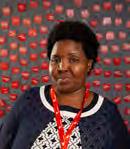
In Ethiopia, Hope for Justice has set up Child Wellbeing Clubs in 100 schools in regions where trafficking is most prevalent. Each school has two clubs, with about 60 pupils between them. As well as 6,000 children meeting weekly to learn about children’s rights and the dangers of trafficking and unsafe migration, the events they hold and conversations they have with peers mean that the true reach of the Clubs is even wider.
In Ethiopia alone, we estimate that Hope for Justice Child Wellbeing Clubs and associated

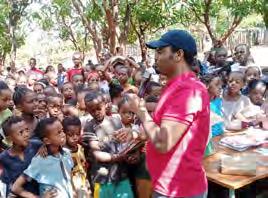
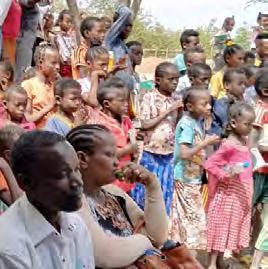
Alongside Child Wellbeing Clubs, our community prevention programmes also include training for community leaders, and setting up Child Protection Committees. These committees bring together the police, social workers, school leaders, religious leaders and other members of the community to identify, report and act on cases of child abuse and exploitation.
Through Hope for Justice Self-Help Groups, mothers receive training in positive parenting, business and financial skills, and on trafficking awareness. They are supported to save as a group and loan those savings to individual members with which to set up businesses. These businesses, in turn, make their families financially resilient against the enticements of traffickers.
You can see the impact of this work in numbers on page 6 and 7.
Annual Review 11
Increasing collaboration with partners and other expert organisations is a key strategic goal for our new UK Programme Director, Kerry Brighouse (pictured, above).
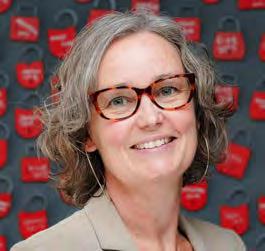
In October 2022, Hope for Justice announced that we had become a founding member of a new UK-based collaboration called the Coalition to Stop Slavery. We are one of 18 charities involved and we sit on the steering committee for the new Coalition, which launched to the public to coincide with Anti-Slavery Day. The campaign focused on the need for a shift in the UK public’s understanding of modern slavery, so millions more people know the signs and how to report concerns. It also called on the Government to ban the import of products tainted by forced labour.

Craig Prest, Executive Director of Digital and Communications at Hope for Justice, said: “We know we are stronger and louder when we work together and speak with one voice. That makes the potential of this Coalition truly exciting.”

The Coalition commissioned fresh research on the public’s knowledge and attitudes about modern slavery. The findings showed that 52% of the population thought they had spotted people
LAUNCH OF THE COALITION TO STOP SLAVERY
they think are victims of modern slavery, but only 35% of those have raised their concerns with police or others. The research, conducted with a nationally representative sample of 1,000 UK respondents, with demographic controls for age, gender, and ethnicity, also showed very high support for more resources for police, more attention from Government and that businesses should be required to do more to prevent modern slavery. More than 80% of people supported each measure.
For the campaign, we partnered with the filmmakers behind some of the John Lewis Christmas adverts to create two hard-hitting videos that expose how modern slavery is often found at car washes and nightclubs. The car wash film took bronze in its category at the 2023 Charity Film Awards. It has been viewed more than half a million times on YouTube alone, and was shared widely on social media.
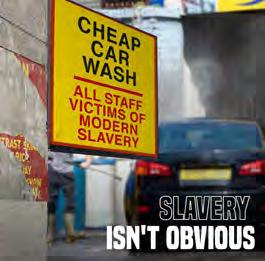
Caroline Haughey KC, one of the country’s leading modern slavery lawyers, with whom we worked closely on the Operation Fort prosecution –the biggest in UK history – added her voice to the Coalition to Stop Slavery. She said: “The pandemic of slavery is riven through our society, from the clothes we wear, to the food we eat and within many of the services we take for granted. We must not close our eyes to it.”
Alongside our work with the Coalition, Hope for Justice and Slave-Free Alliance held a week of events around Anti-Slavery Day, and at the time of writing, we have plans to have even more impact for Anti-Slavery Day 2023.
Annual Review 12
This Anti-Slavery Day we’re coming together to stop slavery once and for all.
I SLEPT ON A DIRTY MATTRESS WITH SIX OR SEVEN OTHER MEN IN THE ROOM HELP FOR SURVIVOR OF UK’S LARGEST TRAFFICKING RING
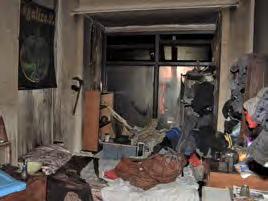
In autumn 2022, a victim of the criminal gang at the centre of the largest modern slavery prosecution in UK history was finally granted Universal Credit after wrongfully being denied the benefit. Janusz* injured his knee while working at a warehouse as part of a new job he had managed to secure after his time in exploitation.
This injury meant he was unable to work, so he needed to apply for Universal Credit – a monthly payment to help with living costs. With no wage coming in, Janusz was getting into debt with his housing provider.
Janusz was trafficked from Poland after being falsely promised a good job, food and accommodation in the UK. In reality, he was exploited for forced labour at a parcel sorting company for more than two years and forced to surrender his wages. He was identified as part of Operation Fort – a long-running investigation by West Midlands Police triggered by and supported by Hope for Justice.
Our team of Independent Modern Slavery Advocates (IMSAs) has worked alongside Janusz, supporting him to give evidence against his traffickers at the most recent Operation Fort trial in 2021, and more recently advocating for him to receive the money he was entitled to. It took eight months for him to finally be awarded the money he was entitled to, in autumn 2022.
One of our IMSAs said: “Janusz’s Universal Credit claim was wrongly denied due to the Department for Work and Pensions saying that he had no access to public funds, because of his immigration status.”
He did in fact have the right to access public funds, because he had Discretionary Leave to Remain and Retained Worker Status. With the assistance of his housing association, Hope for Justice challenged the decision and provided evidence and a supporting letter to show how and why he was entitled to the benefit. When Janusz was finally granted Universal Credit and got it back-dated to when he should have been getting it, he was able to pay off his rent arrears.
Bravely sharing his experiences during a BBC Midlands Today interview, Janusz said: “They promised me a lot but when I arrived, I slept on a dirty mattress with six or seven other men in the room. Conditions were simply tragic. I struggle all the time to recover mentally – I definitely won’t forget this for the rest of my life. It will never be like it was before I came to the UK.”
Janusz was interviewed on the day that three more members of the criminal gang who exploited him (and up to 400 others) were sentenced to jail. To date, 11 people have been prosecuted and convicted. Investigations and legal proceedings connected with this case continue today.
*Name and image changed to protect identity of the survivor. The BBC (below) obscured his identity in the interview.
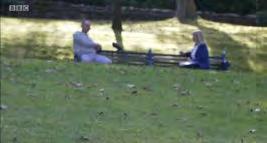
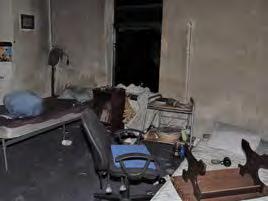
Annual Review 13
“ “
A 15-year-old Ugandan girl helped make her rapist accountable for his actions, and he is now serving 18 years in prison. Shannel*’s trafficker was also fined and forced to pay her six months’ wages.
When Shannel was 14, she had to leave school when her father became ill and was unable to buy food, let alone pay school fees. A neighbour took advantage of the family’s desperation, suggesting that Shannel come to the city to be a domestic worker for her daughter.
Shannel worked for eight months, but was only paid for two. She was also raped twice by her employer’s brother. Shannel bravely reported the abuse to a neighbour, who alerted the police.
TEENAGE TRAFFICKING SURVIVOR’S COURAGE BRINGS ABOUT JUSTICE IN UGANDA
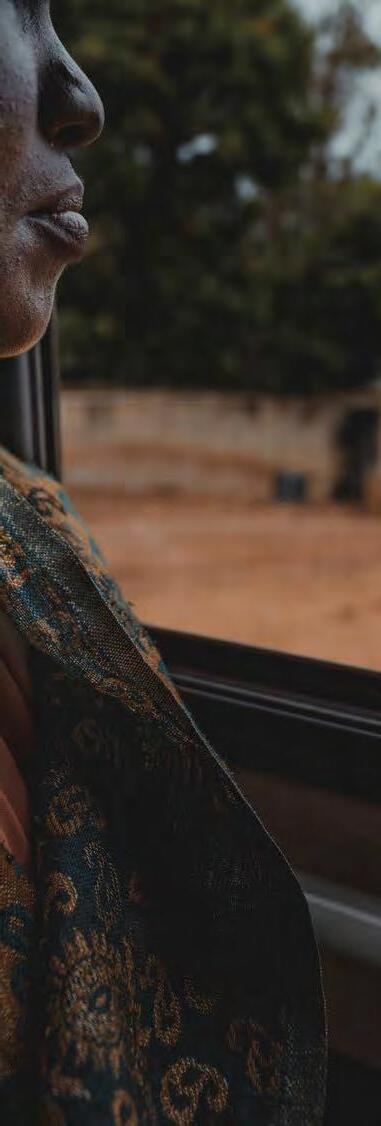
The police station reached out to Hope for Justice to provide specialised support to Shannel. We provided support alongside our partners through the Addressing Child Trafficking and Slavery (ACTS) project in Uganda, which ran until October 2022 and was made possible by the Global Fund To End Modern Slavery (GFEMS) and the U.S. Department of State Office to Monitor and Combat Trafficking in Persons.
Shannel participated in comprehensive traumainformed care services while at one of Hope for Justice’s Lighthouse shelters, which provide temporary care and support to vulnerable and exploited children. She also received legal aid support from ACTS partner, Platform for Labour Action (PLA). Shannel was prepared as a principal witness in her case through a series of confidence-building and legal awarenessraising sessions.
Shannel was then able to provide evidence at the High Court of Uganda with confidence, and the perpetrator was subsequently found guilty of aggravated child trafficking and sexual exploitation. The success of this case has been attributed to the active participation of Shannel.
Over her time with us, Shannel accessed ongoing support from Hope for Justice, including medical care and therapy for depression and anxiety, provided by trained counsellors and a clinical psychologist. Gradually, she healed physically and emotionally. She became more confident and began to participate in activities. Shannel began providing peer-to-peer counselling, and many children told Hope for Justice that she made a very positive impact on them.
Shannel also successfully completed a life skills course at the Lighthouse, which empowered her with knowledge to keep herself safe and well. Shannel participated in vocational training to become a beautician. She became a role model to her peers.
Shannel told Hope for Justice: “Thanks so much for being there for me when I needed help. I now have hope that my future is bright. With the skills training, I will be able to start a business and support my family. I am very happy that my abusers have been sentenced. This should be a lesson to all the people that torment girls!”
Hope for Justice worked with Shannel’s family to provide support and to reduce the risk of further exploitation. We provided the family with a grant to enable them to start a business in pig farming.
*Name and image have been changed to protect survivor’s identity. This article was made possible through support provided by the Global Fund to End Modern Slavery under a grant from the U.S. Department of State. The opinions expressed are those of the author(s) and do not necessarily reflect the views of GFEMS or the U.S. Department of State.
14
UPGRADE FOR UGANDA AND ETHIOPIA IN TRAFFICKING IN PERSONS REPORTS
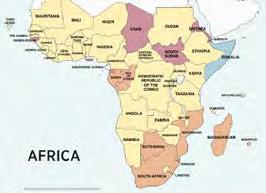
Uganda achieved an improved ranking in the 2022 Trafficking in Persons report and maintained its new Tier 2 grade in the 2023 edition, in which Ethiopia also escaped the Tier 2 Watchlist ranking and became Tier 2. The TIP Report is released annually, assessing the state of the global fight against human trafficking and each country’s response, and assigning them a tier ranking.
Ethiopia and Uganda are Hope for Justice’s two biggest countries in terms of staff and beneficiary numbers. The Tier 2 status which both countries have now achieved means that although their governments do not yet fully comply with the minimum standards of the 2000 Trafficking Victims Protection Act, which the U.S. Government uses as a benchmark, they are making significant efforts to do so.
The TIP Report for 2022 specifically referenced work that Hope for Justice had been doing in partnership with others to collaboratively develop trauma-informed standards of care for survivors of trafficking. As our work on the frontlines in Uganda is showing, child trafficking is on the rise and improved policy responses are vital.
We are part of Uganda’s National Taskforce on Prevention of Trafficking in Persons and the National Child Protection Working Group. Through our evidence-based advocacy, we have helped the government to improve its identification and prevention efforts.
The 2023 TIP report urges the Ugandan Government to “significantly increase the availability of short-term shelter, long-term housing, and specialized services for all trafficking victims... including by partnering with and allocating increased funding to NGOs that provide victim care”.
The same report’s section on Ethiopia highlighted activities that helped improve its ranking: investigating officials allegedly complicit in trafficking crimes; better procedures for victim identification; and increasing efforts to protect Ethiopian migrants returning from work in Gulf states and prevent trafficking among them. But it added: “The Government continued to rely on civil society organizations to provide most victim services, but it did not provide sufficient in-kind or financial support to these efforts.”
Ethiopia Country Director for Hope for Justice, Dereje Zeleke, said: “The fact that Ethiopia moved to Tier 2 is positive progress. It indicates that the Government of Ethiopia has demonstrated increasing efforts compared to past years. The Government has improved service provision for victims of trafficking by jointly operating migration response centres in recent conflict areas of the country. It has also established effective, collaborative efforts in ending human trafficking through strong partnership with civil society organisations.”
Photo, top, shows U.S. Secretary of State Antony Blinken speaking at the TIP Report launch 2023. Below graphic from the TIP Report shows tier rankings of Africa region countries.
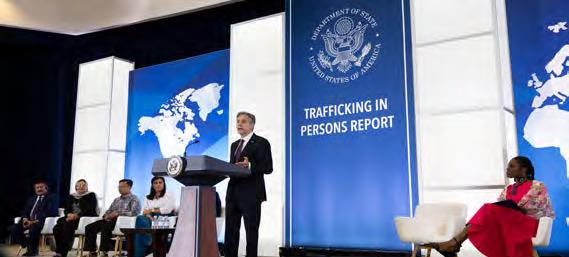
Annual Review 15
Credit: State Department photo by Chuck Kennedy / Public Domain
Survivors of modern slavery and human trafficking are required to navigate complex systems, services and legislation at a time when they are most isolated and vulnerable. An Independent Modern Slavery Advocate (IMSA) works with the survivor to understand and navigate this landscape, while helping them to overcome barriers and empowering them to make informed decisions about their recovery. An IMSA is a trained expert who considers the survivor’s social needs and legal rights together.
There is no accredited provision of independent advocacy for survivors of modern slavery and human trafficking in the UK today, despite this gap being well documented.
Hope for Justice, The Snowdrop Project and the British Red Cross, together with consultants with lived experience of modern slavery, are working to address this gap, building on the Slavery and Trafficking Survivor Care Standards. The IMSA Model Development Project draws upon the model of independent advocacy that has been developed at Hope for Justice over 11 years and independently reviewed by Dr Alexandra Williams-Woods of the University of Liverpool.
INDEPENDENT MODERN SLAVERY ADVOCATES DEVELOPING THE MODEL
The IMSA Model Development Project initiative was launched in 2021 and was endorsed by the then Anti-Slavery Commissioner, Dame Sara Thornton. The project will provide an accredited framework that can be used to deliver a standardised IMSA service for survivors of modern slavery and human trafficking throughout the UK. It is happening in three stages:
1. The framework development (consultation and analysis)

2. The pilot
3. National roll-out of the final model
During 2022-23, Stage 1 of the IMSA Development began with extensive consultation between the partner organisations, frontline staff, consultants with lived experience of modern slavery and others. The response to the consultation process, which finished in May 2023, has been fantastic and organisations and representatives from all UK nations and all sectors participated (a full list is available at the Hope for Justice website).
Stage 2 will be launched on 28th September 2023 when the draft framework will be presented, findings from the Stage 1 independent evaluation shared, and future plans outlined.
During Stage 2, we will work closely with others to ensure the final framework is robust and fit-forpurpose for the whole UK. Details about ways to get involved, as an organisation or as a survivor with lived experience, are available at our website.
Advocacy in action: Stefan’s Story
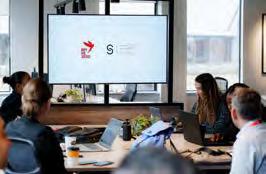
A survivor of human trafficking has been granted settled status in the UK and is able to move on with his life with stability and hope for the future. Stefan said: “I feel good, I feel happy –I wouldn’t know what to do without Hope for Justice’s help.”
Hope for Justice’s Advocacy team has been supporting Stefan*, who is in his late 30s, since December 2017.
Annual Review 16
Stefan grew up mostly in orphanages and later spent time living on the streets, and was exploited in Romania and Bulgaria for forced labour and criminal exploitation from 2013.
He was physically and verbally abused, then trafficked to Spain. He thought his life would improve with a good job, but it turned out he had been recruited to beg on the streets and was forced to hand over any money he was given to his trafficker.
“I didn’t want to go, but he told me I had to, and I was too scared to turn him down,” Stefan said later. “When we arrived at the house, everybody had a bed, apart from me. I had to sleep on pieces of cardboard on the floor in the kitchen.”
He managed to escape from their control and later travelled to the UK on the promise of work in late 2017, but he was arrested at the airport for the crimes he had been forced to commit. This made his recovery more complex, as there was still a live case against him in Bulgaria, where authorities were wrongly under the impression he was a perpetrator rather than a victim.
Asked if he had a message for other people facing similar circumstances, Stefan said: “Be careful who you ask for help, don’t just trust anybody who offers you help.
“Make sure to find the right support from an organisation like Hope for Justice or Citizens Advice, and ask them for help as they have the knowledge and expertise and will give you good advice or point you in the right direction.”
Some of the ways in which Hope for Justice has been able to support Stefan’s recovery:
We helped ensure he had somewhere to live, and to manage his council tax and bills.
We have advocated on his behalf for debts associated with his time in exploitation and recovery to be reduced or wiped.
We assisted Stefan to get new ID to be able to access employment.
• After an accident at his work, we referred him for legal advice and he was awarded £3,000 in an out-of-court settlement, which he used to pay bills and debts. We helped him with food parcels when he was not able to work.
We assisted him to apply for and receive Universal Credit, and to access health services. We helped him apply to the Criminal Injuries Compensation Authority (CICA).
We assisted our colleagues at trafficking legal support charity ATLEU, providing supporting letters and evidence in the immigration case that resulted in Stefan being granted settled status (which gives him the right to live and work in the UK, to access housing, education and health services, including NHS healthcare, and to claim state benefits, where eligible).
Carita Thomas, solicitor from ATLEU, said:
He said at the time: “I was shocked when I was arrested [in the UK] as I couldn’t understand why. It is clear to me now that [the trafficker] and his family set me up. I have been forced to fight to clear my good name when I was the victim in this.”
Lawyers at Hodge Jones & Allen helped get the European arrest warrant overturned by the Court of Appeal and his extradition order quashed in 2019. They said at the time: “Our client has been taken advantage of for most of his life, being forced into modern-day slavery and to work for nothing while being constantly threatened with violence. He fled to the UK to seek a better life but was immediately arrested for a crime he was duped into carrying out.”
He has received a ‘conclusive grounds’ decision, which means he is formally recognised as a victim of modern slavery under the UK’s identification process, the National Referral Mechanism.
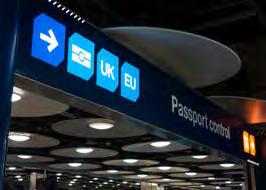
“Hope for Justice have been amazing in their work for our client. I have been beyond grateful for every single time they have helped our client and me.
“Hope for Justice were able to use expert knowledge of trafficking and what recovery requires to explain how our client’s needs could best be met, speaking from their in-depth understanding of the many different barriers our client has faced. Their representations as Independent Modern Slavery Advocates were essential to build the legal case and I could not have achieved any result without them.
“Knowing Hope for Justice was offering a holistic support service to assist with a number of areas not covered by legal aid, with practical remedies and signposting to other services was also very important, so our client could be safe and avoid destitution, allowing us to focus on and then get to our legal goal.”
Annual Review 17
LEARNING AND TRAINING HIGHLIGHTS, 2022-23
Hope for Justice trained 12,183 people globally this year, via 293 in-person and online training sessions. Even more people learned about human trafficking and modern slavery via our online Learning Academy portal, which offers the public and professionals the opportunity to do short, interactive courses on modern slavery topics in their own time.
Here are some of the highlights of the work of those delivering our Training this year:
‘Highly successful’ training in Cyprus
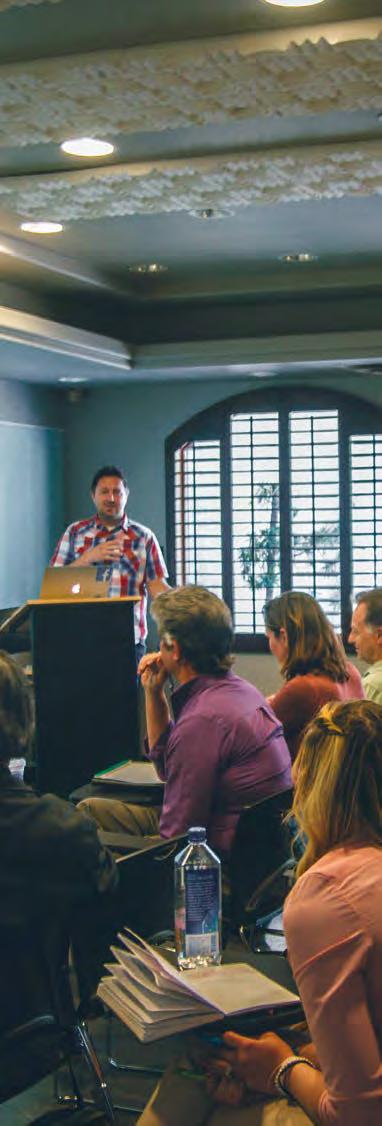
In late 2022, Hope for Justice delivered a training course in the Republic of Cyprus, designed to create broader awareness around modern slavery and human trafficking.
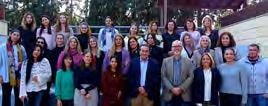
Forty delegates from Cyprus’s anti-trafficking units, labour inspectorate and social worker groups attended the training, learning more about the tell-tale signs of human trafficking and modern-day slavery, and understanding how it occurs through real-life case studies.
Eleni Michael, head of the Republic of Cyprus anti-trafficking unit, praised it as a “highly successful training session”.
Awareness surrounding these issues is especially crucial in the Republic of Cyprus, which has the second highest rate of migration per capita in Europe. With this rate of migration through the country, it is particularly susceptible to trafficking and modern slavery.
Cyprus has a Tier 1 status in anti-trafficking standards, conferred by the U.S. State department in its annual Trafficking in Persons (TIP) Report. This is in recognition of the country “fully meeting the minimum standards for the elimination of trafficking”. The Republic of Cyprus continues to take strides to fortify its antitrafficking response; Hope for Justice’s training is in keeping with this effort.
Hope for Justice’s Training Manager in the UK, Alister Bull, said: “It was a hugely fruitful experience. It was fantastic to see the high-level engagement of the delegates. It also provided a great opportunity for Hope for Justice to best adapt its training materials to the Republic of Cyprus context.”
Hope for Justice created some bespoke awareness materials in the Greek language for the delegates on the course to use in the future.
18
Working with the DEA and HIDTAs
After successfully training federal agents at the DEA (Drug Enforcement Administration, a law enforcement agency that is part of the U.S. Department of Justice) in New York, Hope for Justice was invited to provide human trafficking training at other DEA offices. “Law enforcement is waking up to the fact that there is a real nexus between human trafficking and drug trafficking – the perpetrators are often the same people,” explained our team leader, Richard Schoeberl.
Through their anti-money laundering strategies, banks have an opportunity to detect the criminals responsible. Research by BAE Systems found that 69% of U.S. financial institutions have had to investigate transactions linked to trafficking, much higher than other reported markets. But 75% of employees at financial institutions are not confident in their ability to identify human trafficking signs among transactions.
Hope for Justice has developed training to equip bank employees to identify indicators of trafficking in a person’s financial transactions or when they use a bank’s services. This training –a 45-minute online course followed by in-person training – is being rolled out across Bank of the West’s 600 branches.
If a bank employee has reason to suspect a customer of being involved in trafficking, as a victim or perpetrator, they can file a Suspicious Activity Report (SAR). This is then investigated by the Financial Crimes Enforcement Network, a division of the U.S. Treasury.
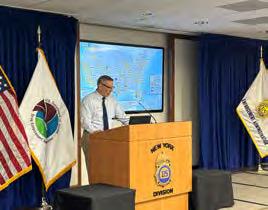
Among the places we provided training was New Mexico, following an invitation by the New Mexico HIDTA (High Intensity Drug Trafficking Area) Program. Hope for Justice Investigator and Trainer Bill Loucks, who knows the issues firsthand, having been a former law enforcement officer for more than 15 years, said: “Human trafficking training for law enforcement is critical to effectively fight modern-day slavery.”
He and fellow investigator Jeff Bolettieri later provided similar training to the New England HIDTA. Jeff said: “How can we eradicate modern slavery? The answer is education. We must bring awareness to everyone. Not only law enforcement and prosecutors, but also healthcare providers, hospitality, banking personnel and the general public. The police cannot do this alone.”
Educating bank workers
Hope for Justice is delivering training to Bank of the West’s 10,000 employees so they are equipped to identify human trafficking in-person and in customers’ financial transactions.
Workers in this sector can be a frontline defence against human trafficking, which is a tragedy for millions of individuals – but for criminals, it is big business. Their profits and expenses leave a trace through their financial transactions. Banks and other financial institutions are in a prime position to spot the signs of trafficking, which generates an estimated $150 billion of illegal profits every year. These profits have to be disguised before they can be introduced into the legitimate financial system (money laundering).
Richard Schoeberl, Hope for Justice’s U.S. Team Leader for Investigations, explained: “It’s about spotting what should be there but isn’t, as well as what is there but shouldn’t be. A typical person’s bank account will show money going out for bills, groceries, car payments. But someone having their finances controlled by a trafficker won’t have those expenses. Instead, you might see lots of cash coming in and out, or charges for online advertisements, hotel rooms, and multiple cell phones.”
Awards recognition for online grooming training video
An interactive video produced for our free ‘Keeping Kids Safe in the Digital World’ e-learning course has received four prestigious Telly Awards.
In the video, the final core module of three, the learner follows an average American teenager as he becomes a victim of online exploitation via a gaming platform. It is up to the learner to intervene at the most important moments in this boy’s story, to keep him safe.
It is one of seven courses available via the Hope for Justice Learning Academy online portal, some of which are aimed at workers in specific industry sectors, including hospitality and healthcare.

Annual Review 19
HOPE FOR JUSTICE RESTORED THE TRUST I NEEDED”
A survivor of child sexual abuse, whose perpetrator was finally brought to justice after nearly 30 years, says that the support she received from Hope for Justice is one of the reasons she felt able to move forward with the case.
Sanna McAuliffe was six years old when the abuse happened. Although it was reported at the time and the abuser – who was at that point her stepfather – admitted what had happened, the investigation was wrongly ended and then buried, and he lived in freedom for nearly three decades. That was until Sanna decided, despite the anxiety and trauma she felt, that she needed to seek justice and do everything she could to get the investigation reopened and done properly this time.
Sanna received support from her sisters, and it was her sister Christina who connected her with Hope for Justice soon after she had decided to step up her renewed attempts to ensure there was a criminal investigation, in mid-2021.
Richard Schoeberl, Hope for Justice’s U.S. Team Leader, explained the help we were able to offer: “We advocated for Sanna, looking into the past allegations, locating the stepfather and sharing that information with the state’s victim coordinator. This case had fallen through the cracks. We worked with her to counsel her on the right path to take in order to get this investigation resurrected.”
Together with our Senior Investigator David Gonzalez, our team helped Sanna feel empowered to take the next steps. She said: “I can say that Rich and David are the reason I moved forward. They showed thoughtfulness and advocacy and trust. They restored the trust I needed in the system, that it was still possible for justice to be done. Without advocates like Rich and David and my sisters, I might have carried on as I was, telling people I was fine but actually not.”
October 2022: The sentencing
Sanna’s efforts culminated in a sentencing hearing in October 2022. The charge that Malcolm Fogg (of Lyme, New Hampshire) pleaded guilty to was aggravated felonious sexual assault, for which he was sentenced to 12 months in the Grafton County House of Corrections plus two years on probation.
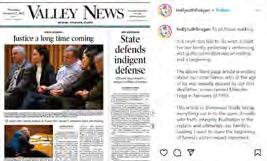
“Until I really started to dive into the case, I didn’t realise the amount of trauma that’s probably inside of me,” she said. “With the criminal case, I felt so empowered. Having my voice heard,
looking straight at the judge, knowing that I am doing this for myself, for my children, for other survivors – and that I’m not stopping here.”
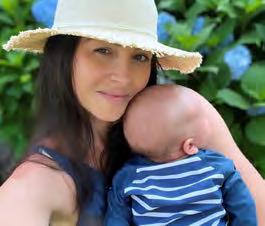
Hope for Justice has extensive experience of supporting survivors of historic abuse. While Sanna McAuliffe’s case, on investigation, was not one involving human trafficking but rather familybased abuse, our team decided to continue to offer the support that was needed to ensure justice was done. Senior Investigator David Gonzalez explained that he has worked many other investigations that began with apparently single incidents that ended up linked to a wider pattern of exploitation, trafficking and other crimes. “Investigating these types of cases, I’ve found it not uncommon for defendants to have committed multiple criminal acts, such as sexual abuse of a minor and then we later learn of a possible trafficking situation – we will leave no stone unturned in seeking to determine whether human trafficking exists when we investigate a report like this one.”
To anyone else trying to seek justice, whether for sexual abuse or human trafficking or any other crime, Sanna said her message is: “Trust yourself and surround yourself with people you can trust.”
NOTE: Hope for Justice would not usually identify survivors, however for this article, Sanna McAuliffe asked us to use her real name. “By going public with my story and my voice, I hope to provide hope and courage to other survivors,” she said. A longer version of this interview is available at our website.
Annual Review 20
U.S. SURVIVOR STORY:
“
REFORMING SOCIETY POLICY,
LEGISLATION AND INFLUENCE, 2022-23
Reform is a process that involves initiating and strengthening legislation, policy, practices, standards, structures, knowledge, beliefs and behaviour. We drive change by increasing society’s understanding of modern slavery, and influencing people to take action. Through training, advocacy and collaboration, we promote best practice, ensuring knowledge is passed on and developed.
Highlights from our work with UN agencies and international bodies
- In May 2022, we hosted a side event at the 31st session of the UN’s Commission on Crime Prevention and Criminal Justice (CCPCJ), focusing on survivor-centred approaches to trafficking prevention.
- We spoke at the UN Office on Drugs and Crime’s Constructive Dialogues on Trafficking In Persons and the Smuggling of Migrants, on how civil society contributes to joint or parallel investigations and specialized anti-trafficking prosecutions.
- We attended and contributed to the 1st Interpol Senior Working Group on Child Safeguarding.

- We hosted and spoke at an NGO side event at the 67th Session of the UN’s Commission on the Status of Women.
- In October 2022, we spoke at the 11th Session of the Conference of the Parties to the UN Convention Against Transnational Organized Crime in Vienna. We spoke about the importance of safe and legal migration routes to prevent both people smuggling and people trafficking.
- We attended OSCE (Organisation for Security and Co-operation in Europe) events in Vienna on anti-trafficking issues in April 2022 and April 2023, where our CEO Tim Nelson also met with former British Prime Minister, Theresa May MP.
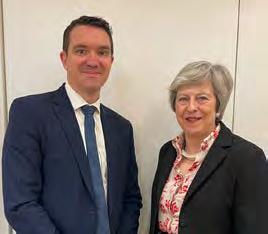
Highlights from our policy and reform work in specific countries
Ethiopia
- We worked with Addis Ababa police to improve investigative systems in trafficking cases through forensic interview and investigation, so perpetrators are held accountable.
- With the federal Ministry of Women and Social Affairs (MoWSA), we established the country’s first National Child Parliament, with 131 members, to ensure meaningful child participation in processes and policies that affect them and their rights. We are also working with MoWSA on a positive parenting manual and child protection case management training.
- The UN Special Representative of the SecretaryGeneral on Violence against Children visited two of our Lighthouses, sharing views and holding discussions with the children and staff.
- Hope for Justice is convening a new consortium of shelter service providers working on child exploitation in Addis Ababa.
- We organised a research conference in October, bringing together academics, policy makers and civil society organisations to discuss mental health issues when dealing with victims, families, communities, law reform and enforcement.
- We provided hundreds of hours of specialised training in Ethiopia during 2022-23. We offered child protection training for officials, community members and religious leaders to reduce children’s risk of trafficking and abuse through addressing discrimination and social exclusion. We provided victim-focused law enforcement training on trafficking and gender-based violence to judicial officers, law enforcement and social services workers in the Amhara National Region, and offered training and post-training support for Addis Ababa and Federal Police. We gave rigorous case management training for governmental actors and offices. There has been progress in implementing consistent, effective and systematic services for victims of trafficking. We also provided mental health training for social workers and frontline workers, including access to one-toone and group counselling sessions.
Annual Review 21
United Kingdom
- We contributed to the Modern Slavery Strategy reviews in England & Wales, and in Scotland.
- We provided evidence, briefings, draft amendments and advocacy on the potential harmful impact of the Nationality and Borders Act and subsequent guidance. This included evidence to the Home Affairs Committee Inquiry into Human Trafficking.
- We provided similar evidence in 2023 about the Illegal Migration Bill. This included submitting written evidence to the Joint Committee on Human Rights Inquiry on the Illegal Migration Bill.
- We engaged with support providers and local authorities on meeting the needs of trafficking survivors through the Care Act 2014.
- We engaged with HM Prison and Probation Service to improve policy and responses to modern slavery within their systems.
Uganda
- Hope for Justice coordinated the co-development of evidence-based National Guidelines on Care and Support for survivors of trafficking in persons, with the Uganda Ministry of Gender, Labour & Social Development and the Rights Lab of the University of Nottingham.
- We provided practical training on traumainformed care to frontline practitioners drawn from anti-trafficking organisations in Uganda through an immersive learning programme.
- We helped train judicial officers on victimcentred, trauma-informed approaches in court processes, with the Human Trafficking Institute.
- We helped to develop an agreement between the Office of the Director of Public Prosecutions and CIVIPOL for the enhancement of victim participation in court processes for perpetrator accountability.
- We helped with the National Communications Strategy for Prevention of Trafficking in Persons, led by the National Task Force.
- We participated in civil society training on applying the Instruments of the Review Mechanism of the UN Convention against Transnational Organised Crime. This led to the formation of a regional network of civil society groups from Eastern and Southern Africa to coordinate in support of the implementation of the Convention.
Hope for Justice frequently works with or is represented on influential networks including:
11 Alliance 8.7
12 Liechtenstein Initiative
13. The Knoble Financial Crimes Working Group to Prevent Human Trafficking
14. Modern Slavery Strategic Implementation Group (MSSIG) on Prevention (Co-chair) (UK)
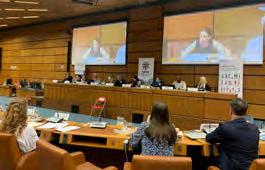
15. MSSIG on Victim Care (UK)
16. MSSIG International Group (UK)
17. MSSIG on Transparency in Supply Chains (UK)
18. Oversight Group for the National Modern Slavery Statutory Guidance on Identification and Care (UK)
19 Advisory Group on National Training Standards (UK)
20 Home Office Group on Developing Modern Slavery Training (UK)
21 Walk Free Brexit Groups (UK)
Annual Review 22 National and International
Influence
1. BMM Regional CSO Network 2. National Task Force on Prevention of TIP (Uganda) 3. National Child Protection Working Group (Uganda) 4. Alternative Care Technical Working Group (Uganda) 5. Uganda Child Rights NGO Network 6. Uganda Legal Aid Service Providers Network (LASPNET) 7. Coalition Against Trafficking in Persons in Uganda (CATIPU) 8. National Refugee Protection Working Group (Uganda) 9. Eastern and Southern Africa Regional Learning Platform on Care Reform 10. International Anti Human Trafficking Advisory Group (UK)
United States of America
- Hope for Justice successfully advocated for the inclusion in an upcoming Bill of mandatory regular training for all hotel employees to recognise the signs of human trafficking and report appropriately. Hope for Justice was one of only two anti-trafficking organisations invited to submit testimony for the committee hearing into the implementation of new legislation that would address significant gaps in the federal policy response to trafficking.
- We promoted and were official stakeholders in four critical child protection and exploitation Bills: the STOP CSAM Act, the SHIELD Act, the Protect Safe Childhood Act and the EARN IT Act.
- We conducted outreach and advocacy for the re-introduction of the Trafficking Survivors Relief Act, which would expunge unjust criminal records related to the trafficking experience of survivors.
Above: Hope for Justice CEO, Tim Nelson, being interviewed on camera in Houston, TX

- In February 2023, we convened the second annual Anti-Trafficking in Persons Policy Roundtable in the U.S. Senate (pictured below), attended by nine Congressional offices and more than 20 influential anti-trafficking organisations to discuss policy priorities at the start of the 118th Congress. Anne Basham, who helped to facilitate the event on behalf of Hope for Justice, said: “It was humbling to see so many amazing people in one space all so engaged and inspired.”
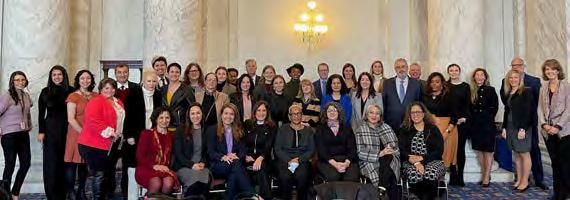
(ACERWC) (Ethiopia)
Coalition for the Prevention and Control of Human Trafficking and Smuggling of
Annual Review 22. Anti Trafficking Monitoring Group (UK) 23. Human Trafficking Foundation Network (UK) 24 ETI (Ethical Trading Initiative) 25. CEO Network (UK) 26 Mecklenberg County Task Force (US) 27. Human Trafficking Commission of NC (US) 28 Iowa Network on Human Trafficking (US) 29 Businesses to End Human Trafficking in Iowa (US) 30. Tennessee Bureau of Investigation Task Force (US) 31. Nurses United Against Human Trafficking (US) 32. Consortium of Christian Relief and Development Associations (CCRDA)
33. Supreme Court Referral Network (Ethiopia) 34 Child Protection Case Management Working Group (Ethiopia) 35. Child Research and Practice Forum (Ethiopia) 36 Consortium of Self Help Approach Promoters (Ethiopia) 37. African Committee of Experts on the Rights
Welfare
Child
38. National Partnership
Migrants,
the Deputy
Minister
39. National Advisory Group on Child Rights
40. National Technical Advisory Group for Alternative Childcare
41. Ethiopian Civil Society Organization Council (Ethiopia) 42. Debo Alliance for the Children (Ethiopia) 43. The Alliance of NGOs on Crime Prevention and Criminal Justice 44. INTERPOL Senior Working Group on Child Safeguarding
(Ethiopia)
and
of the
chaired by
Prime
of Ethiopia
and Protection (Ethiopia)
(Ethiopia)
23
HOPE FOR JUSTICE IN THE MEDIA AND IN THE COMMUNITY
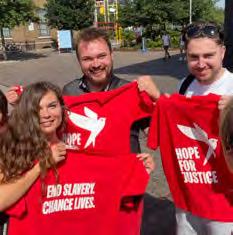
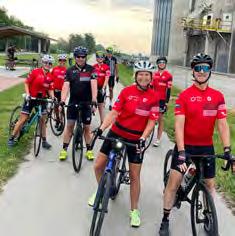
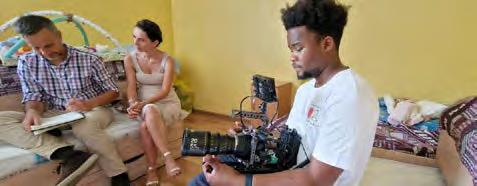
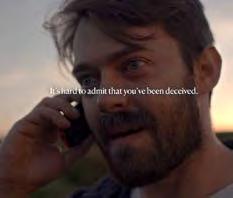
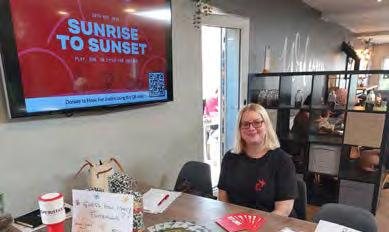
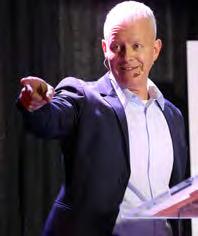

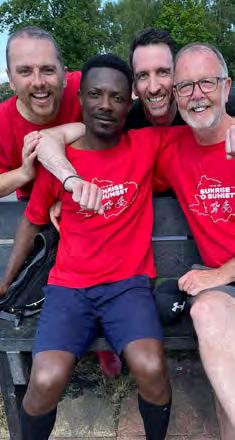

Annual Review 24
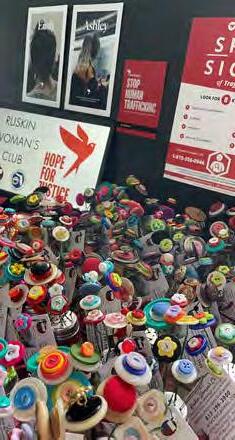
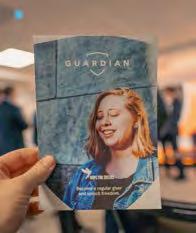



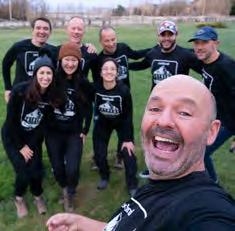
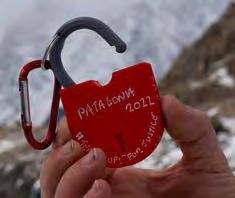
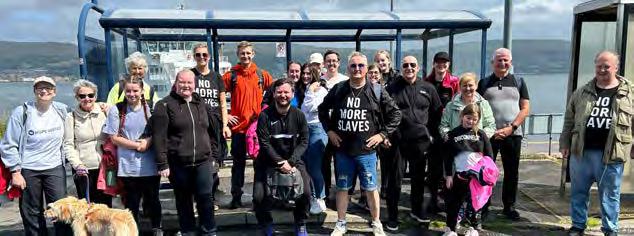
Annual Review 25
HOPE FOR JUSTICE IN THE MEDIA AND IN THE COMMUNITY
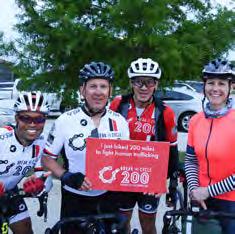
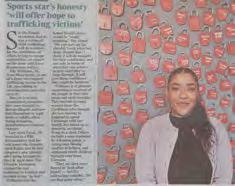
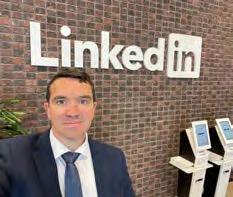
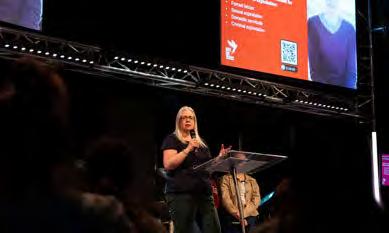


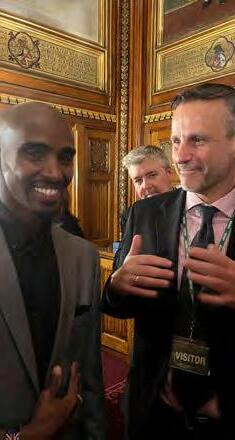
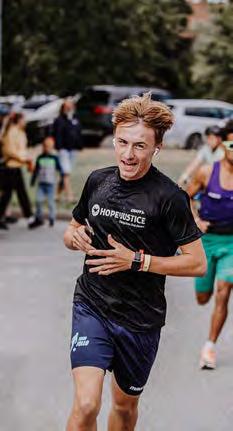

Annual Review 26
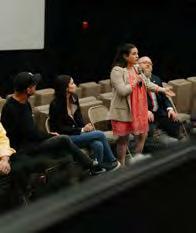
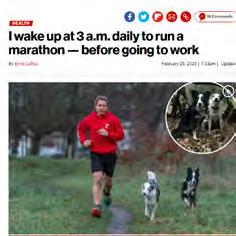


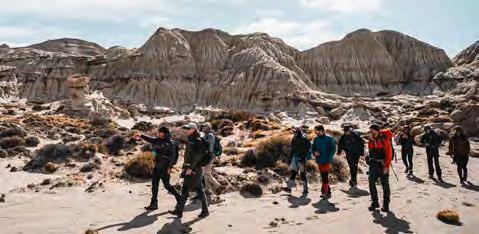
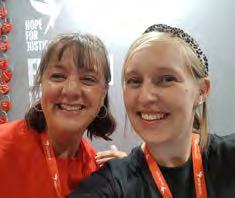

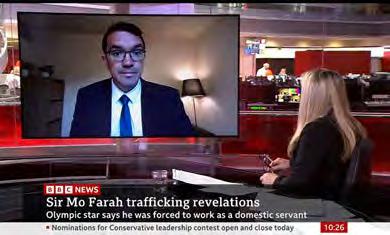
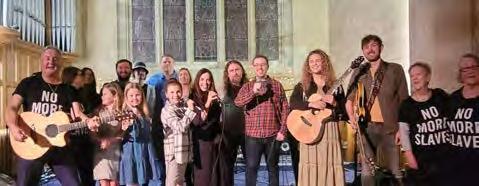
Annual Review 27
EXTREME CHALLENGE PATAGONIA
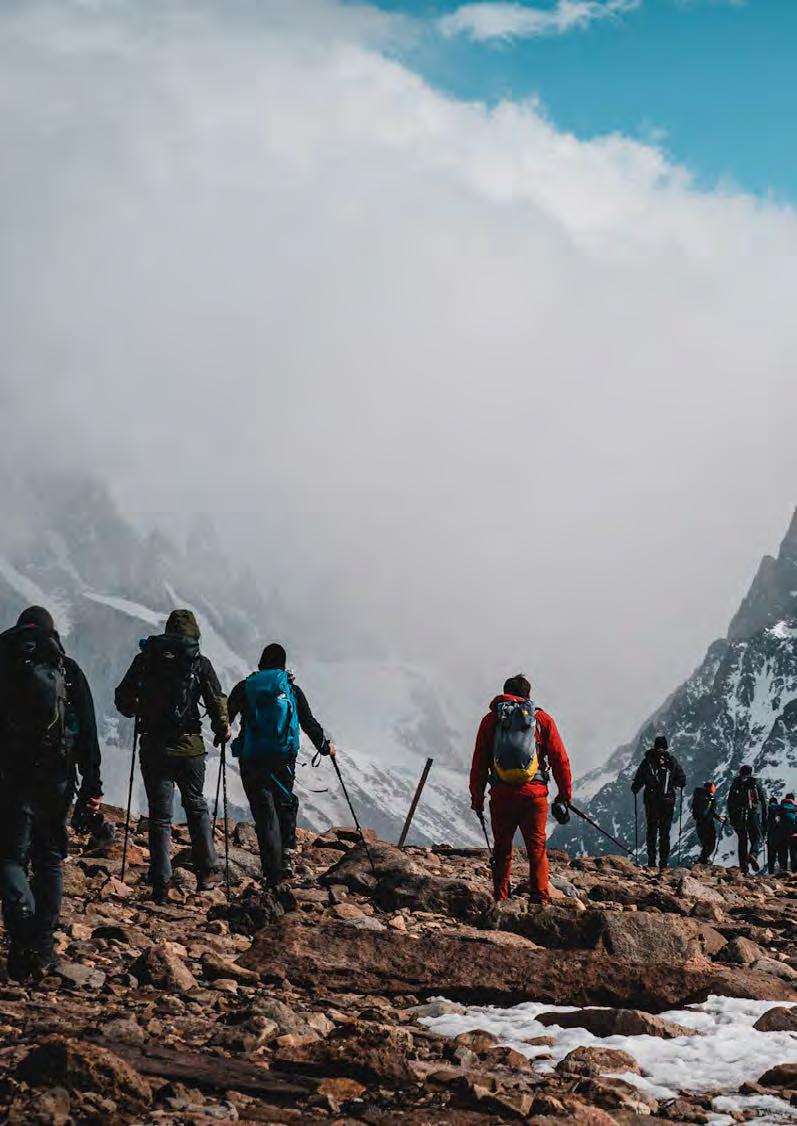
28
In October 2022, Tim Nelson, CEO of Hope for Justice and Slave-Free Alliance, led a brave team of explorers on an epic seven-day trek through the Patagonia wilderness to raise awareness and funds for the fight against modern slavery.


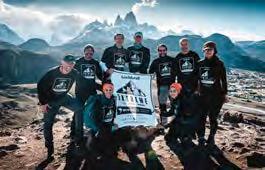

One of the trekkers, Eric Staal, who leads the Global Markets team at the world’s leading network of independent law firms, Lex Mundi, called the event a “life-changing experience” He said: “To stop modern slavery from getting into your value chain requires long vision. That’s why we brought together Lex Mundi members, corporate counsel, business partners and good friends to support the life-saving work of Hope for Justice and Slave-Free Alliance.”
The team pushed themselves hard, found new friends for life, and most importantly raised tens of thousands of pounds for the vital cause of ending modern-day slavery.
In October 2024, Hope for Justice is hosting our next Extreme Challenge, this time to the awe-inspiring Drakensberg mountain range in South Africa. Could you be part of the team?
Full details at hopeforjustice.org/drakensberg
29
WE WILL BE THE GENERATION TO END HUMAN TRAFFICKING

There are so many ways to get involved and support the work of Hope for Justice. We would love to partner with you. Why not consider making us your Charity of the Year?
Get in touch:
supporters@hopeforjustice.org
30
CHURCH PARTNERSHIPS
Thank you to all our church partners and community groups who supported the work of Hope for Justice this year. We hugely appreciate all the events, fundraisers, talks and fun activities that everyone has been doing.
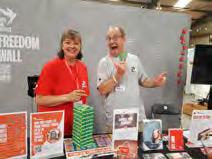
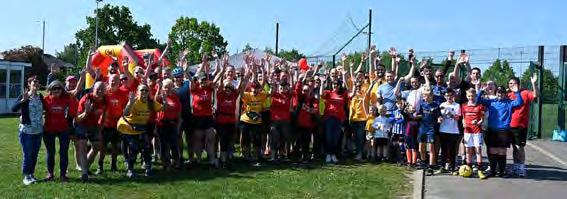

Ever since Hope for Justice was founded in 2008, churches have been instrumental in supporting our work – being trained to spot the signs, through regular giving, fundraising and by playing a key role in raising awareness about modern-day slavery and human trafficking in our world.
Hope for Justice exists to live in a world free from slavery. This is a big vision which needs every person to play their part. The global scale of the problem has been met with a wave of unity across church communities who have committed themselves to stand with us in ending slavery and changing lives.
In December 2022, a Hope for Justice volunteer spoke at an event organised by Holy Trinity Church in Leicester, UK. Just a few weeks after the event, we learned that an NHS worker who attended the session had identified a potential victim of modern slavery.
The NHS worker reported the suspected modern slavery case to the police, and an Albanian man was supported to exit exploitation.
Officers referred him into the National Referral Mechanism – the UK Government’s framework for formally identifying and providing support to victims of modern slavery. He was provided with emergency accommodation at a hotel.
Three of our staff members attended the event to run a stall and distribute leaflets. They engaged with about 100 people by educating them and raising awareness of modern slavery. They also spoke with attendees about how to spot the signs of exploitation and how to provide the right support.
One of our Community Engagement Specialists said: “We’re really pleased the information that was shared has led to a victim being identified and placed on a pathway to receive support. The church’s enthusiasm is brilliant. It’s wonderful that they were able to get this person the help they needed. We are looking forward to working alongside Holy Trinity Church in the future with the hope of securing more outcomes like this.”
We have seen many similar examples of how the support of churches has had a practical impact in the fight against modern slavery.
You can find out more by emailing supporters@hopeforjustice.org or visiting hopeforjustice.org/church
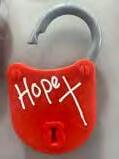
Annual Review 31
KOURTNEY KARDASHIAN BARKER & HOPE FOR JUSTICE CEO, TIM NELSON
TIM NELSON
KOURTNEY KARDASHIAN BARKER
Reflecting on what she had learned from Tim and her time hearing about the work of Hope for Justice, Kourtney Kardashian Barker says she came away more optimistic:
“Knowing that there’s hope, and that people can make a change – especially, hopefully, the companies. I think it starts with the companies as well as consumers.”
Hope for Justice CEO, Tim Nelson, shared key messages with global influencer and celebrity Kourtney Kardashian Barker as part of a new documentary series examining issues of exploitation and waste in the fashion industry.
In his interview with Kardashian Barker, Tim speaks of the power of consumers to influence fashion brands. He says ethical supply chains can and do exist, where workers’ rights are respected and they are paid and treated well.
In the interview, Tim Nelson tells her: “There are 75 million people estimated to be working in the garment industry, and what makes a good or bad company is not whether or not they have some form of modern-day slavery; it’s whether they’re prepared to look. [And] if they look, what will they do when they find it?”
Tim, who also sits as a founding trustee on the Garment & Textile Workers Trust (G&TWT), says: “Sometimes we can think we have no power. But as consumers, we can ask the questions. We can withhold our purchase until we see that these things are being done to protect the most vulnerable. My hope is that by people listening to this, that there might be people listening
who themselves are in a place of modern-day slavery, and they might be able to connect with us or connect with the authorities and see themselves set free.”
Kardashian Barker shared information about the series on social media to her 200 millionplus followers, and in the reality TV series The Kardashians in summer 2023.

During the documentary series, she hears from Tim and other specialists in areas including worker welfare, human rights, textile waste, upcycling, and vintage fashion.
Kardashian Barker thanks Tim for his insights, and in a statement she said: “I’m grateful for the opportunity to use my platform to drive conversations that lead to ongoing change and use my voice to share actionable tips with consumers on how we can play our own part.
“There’s still lots of work to be done and improvements to be made, but I truly believe that any progress we can make when it comes to sustainability is a step in the right direction and will open up the conversation for future advancements.”
Annual Review
INTERVIEW:
32
SLAVE-FREE ALLIANCE IS PROUD TO PARTNER WITH OUR 119 MEMBERS.*



























Here are just some of them!

Annual Review 33
*At the time of publication
Slave-Free Alliance (SFA) celebrated the fifth anniversary of its founding in April 2018 this year. It now has 119 members, of which 14 are constituent businesses of the FTSE 100 index.
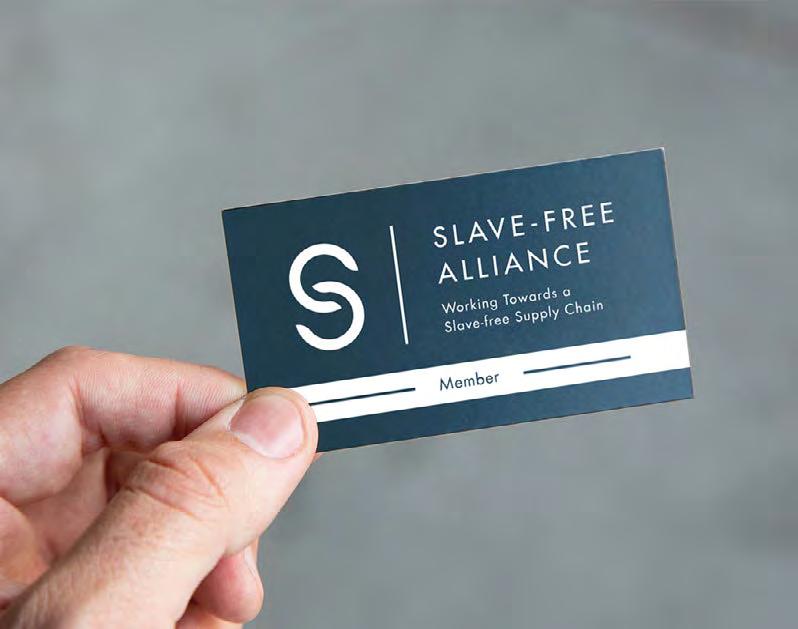
SFA works with organisations of all sizes and complexity – from multinational companies like these, to individual hand car wash businesses. We operate in the UK, USA, Australia and now also in Norway following a successful launch in 2022-23.
SFA is a social enterprise that is wholly owned by Hope for Justice, with all profits reinvested in our charitable projects.
The SFA team has a track record of supporting organisations of all sizes and from many sectors to build their resilience to modern slavery and labour exploitation, in their own operations and also vitally in their supply chains around the world. Their ambition is to act as a ‘critical friend’ to businesses who are trying to do more in this area.
Over these pages you can read some of the highlights of SFA’s work this year.
MORE MILESTONES REACHED FOR SLAVE-FREE ALLIANCE
SFA warns of low awareness of Xinjiang forced labour import ban
In June 2022, SFA was among the first organisations to warn of the very low number of businesses who appeared ready for the changes that came into force through the U.S. Uyghur Forced Labor Prevention Act
Absolutely everything that is mined, produced, or manufactured wholly or in part in the Xinjiang Uyghur Autonomous Region, or by certain legal entities, is now presumed by the U.S. Government to be made with forced labour and prohibited for import – unless very detailed documentary evidence can be provided to challenge this presumption.
Marc Stanton, SFA Director, said: “We work with many of the world’s largest multinational businesses, who collectively employ more than 1.2 million people and turn over hundreds of billions of dollars, and we have been startled how few of them are prepared for the implementation of this complex and wide-ranging legislation.”
34
Award for groundbreaking tool showing forced labour in supply chains
SFA and Hope for Justice are proud to have won the SAS Hackathon 2023 (Americas region) for the creation of a visual dashboard showing forced labour by country, industry and commodity, pulling from a variety of data sources and formats.
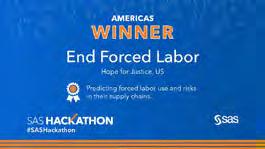
SFA’s Marc Stanton and Tom Frost were the subject matter experts on a team that also included data scientists from leading universities and two mentors from analytics company SAS.
The other team members were Becky Lorig from the University of Nevada, Las Vegas; Zoraya CruzBonilla, MPA from Binghampton University; Arpita Deb from Drexel University; and Tom Sabo and John Stultz from software and analytics company SAS. Globally, more than 100 teams representing 140 organisations competed in the Hackathon.
‘Team End Forced Labor’ created a dashboard tool allowing users to interrogate the data visually, for example clicking on a country and getting useful statistics, or seeing country rankings of imports of goods known to be highest-risk for forced labour and child labour.
Tom Frost, Advisor on Human Rights in Supply Chains at SFA, said: “It’s incredible just how much was achieved in such a short space of time. There is so much data in the public domain about modern slavery and forced labour, but it’s in so many different places and in so many different formats: numerical data, journal data, imagebased data. Compiling all that into a single tool for businesses to use – the potential is enormous if this was developed on a full-time basis.”
Addressing supply chain leaders and sharing key messages with media

Slave-Free Alliance’s leadership team spoke on a number of major platforms throughout 2022-23, informing thousands of supply chain leaders and managers about the hidden realities of modern slavery and forced labour exploitation. They spoke at seminars, conferences, podcasts and symposiums organised by the likes of:
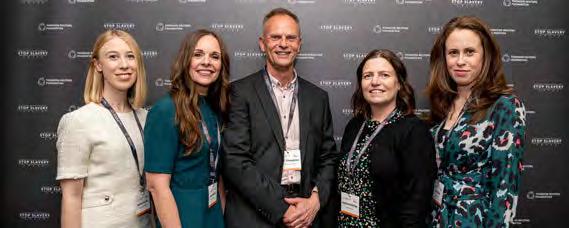
LinkedIn
Gartner
• Concerto
• Sands Capital Savant
Everstream
• Rotary International
• Good On Purpose
Supply Chain Now
Law firm Jones Day
• Exiger
Slave-Free Alliance team members and Tim Nelson, CEO of both Hope for Justice and SFA, appeared frequently in the media to discuss modern slavery and forced labour exploitation. In 2022-23 alone, this included BBC News, ITV News, Retail Gazette and The Times.
To invite an SFA speaker to your event or media opportunity, let us know by emailing info@slavefreealliance.org
Below: Slave-Free Alliance facilitates collaborative industry groups including Utilities Against Slavery, which in 2022 was shortlisted for the Thomson Reuters Foundation’s Stop Slavery Award in the category of Collaboration.
Annual Review 35
One partner we have worked with closely this year is Sunbelt Rentals, the UK’s largest equipment rental provider and part of Ashtead Group plc, a constituent member of the FTSE 100 index. We have worked alongside Sunbelt Rentals since they joined SFA in 2021 across a range of areas, including assisting with their modern slavery statement, whistleblowing policy, a gap analysis with actions and recommendations, general and specialised training, supply chain conversations, and deep-dive assessments at particular sites and occasions.

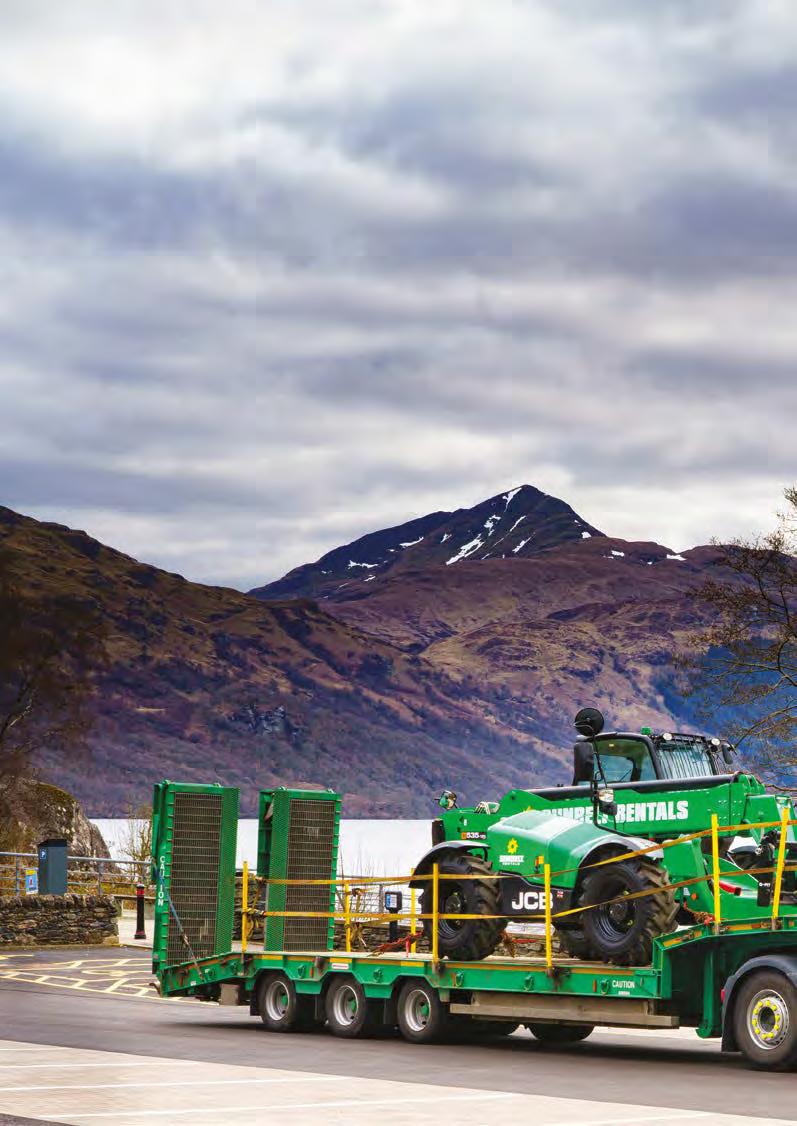
David Phillips, Sunbelt Rentals Operations Director, said: “Modern slavery is a complex issue. It can affect all areas of a business and supply chain. Being responsible is one of our six core values at Sunbelt Rentals. We’re committed to tackling that risk and we’re doing it to protect our people, to protect the business and protect the markets that we operate in. To do that we’ve enlisted a trusted partner: Slave-Free Alliance.
“Supply chains are complex; ours is no different. We have over 1,000 suppliers that provide different products, services and activities. You have to manage that risk by giving the control and training to your people to make them aware, to be able to mitigate, identify and deal with that risk.
CASE STUDY: SUNBELT RENTALS
“But you also have to do that for your suppliers in in the same way. SFA have been really helpful in working with us and helping us work through how you identify that risk – how you approach the supplier. The suppliers have been fantastic as well and it’s become a real tripartite strategy to try to deal with this and manage it. As a large business with over 1,000 suppliers, you’ll appreciate how complex it is to bring a supplier into our business. We have a very strict onboarding process. SFA has helped us to enhance that process by building in some of the risk identifiers, so that when we’re talking to suppliers, either right at the start or even with mature suppliers, that onboarding process has been boosted.”
David said he particularly values the support structure that SFA brings: “It’s really good to know that we can pick up the phone and have a practical, pragmatic discussion with somebody who understands the issues and help us come to a resolution. The second area I’ve found most valuable is the gap analysis. It’s very practical and hands-on and it allows you to focus into areas of your business that you probably would have found yourselves, but taken a lot longer to get there! It also gives you some real functional activities that you can set the organisation on; goals that work towards tackling the issue of modern slavery.”
36

37
Expanding SFA’s work to cover businesses across the United States
Slave-Free Alliance is global, with members in the UK, Norway (see below), Australia and now the United States. We have been delivering gap analyses, training, site assessments and other core products, offered in the context of U.S. cultural considerations and legislation. This includes State-level legislation like California’s Transparency in Supply Chains Act 2010, and Federal laws like the Trafficking Victims Protection Act 2000 (and its reauthorisations) and various provisions in Title 18 of the U.S. Code.

One SFA member business is Sands Capital, which is an independent, staff-owned firm founded in 1992 and headquartered in the Washington, D.C. area with offices in London and Singapore. Sands Capital managed $51.0 billion in client assets as of June 30, 2023*. Sands Capital describes its experiences with SFA in its annual transparency statement: “As part of our due diligence around modern slavery, both within our business operations and our investment activities, we leveraged our relationship with SFA as an outside
expert. During the early stages of our relationship with SFA, we commissioned a gap analysis of our operations and investment practices.
“This gap analysis is an independent review of our organization’s understanding and response to our modern slavery and labor exploitation risks, conducted in view of relevant legislation and industry best practices. The key output is a detailed, evidence-based report that details identified risks and best practices and provides a set of clear, defined, and actionable recommendations ... the gap analysis yielded a bespoke action plan that prioritizes the recommendations based on risk and leverage, including six key risk areas for Sands Capital to address in the years ahead.”
We are hugely proud of this work and the relationships we are building with Sands Capital and other companies across the United States.
*AUM includes the discretionary and non-discretionary assets of Sands Capital Management, LLC as of June 30th 2023, and the gross assets of all funds (not including uncalled capital) for Sands Capital Ventures, LLC. Figures for Sands Capital Ventures, LLC are updated 45-60 days after quarter-end.
SFA works in Norway to support businesses with Transparency Act

In August 2022, SFA officially launched its services in Norway to support businesses with their obligations to uphold human rights and ensure decent working conditions under the Transparency Act. Norway’s new legislation means that more than 8,800 businesses operating in the country need to take action.
SFA has already been supporting businesses which fall within the scope of comparable legislation, like the UK Modern Slavery Act 2015, and Australia’s Commonwealth Modern Slavery Act 2018. Marie Nordby, Business Development Manager for SFA Norway, said: “Now that the Transparency Act is in force, we encourage businesses to review and assess their biggest risks and focus on addressing them. Don’t forget to set up a system for sharing information with the public – and start drafting your annual statement now.”
We ran webinars in late 2022 focusing on these issues. Nadia Ullah, Legal Advisor at the Norwegian Consumer Authority, was a guest speaker.
Rachel Hartley, Consultancy Director at SFA, said: “A common challenge that UK businesses faced after the introduction of the UK Act was not having enough supply chain visibility, which hindered their ability to engage with legislation. My advice for Norwegian businesses would be to undertake supply chain mapping to achieve a sufficient level of transparency.”
Annual Review 38
Conference inspires businesses to build resilience against modern slavery
SFA hosted our largest-ever in-person conference and seminar in September 2022, as 120 people –representing 65 organisations – came together to share their insights on the steps they are taking to mitigate the risks of modern slavery and labour exploitation in their operations and supply chains.
SFA’s Jessica Garratt said: “There was fantastic engagement across the board. The event gave our member organisations the opportunity to meet in-person, network and learn from one another. It was great to see members engaging with other businesses in their sector, such as Yodel representatives speaking with Evri and Sunbelt Rentals connecting with Network Rail, but also to see this happening organically across sectors.”
Organisations including John Lewis, Morrisons and FTSE100 retailer Kingfisher plc (owner of the B&Q and Screwfix brands), attended the event, held at the Science and Industry Museum in Manchester. It drew international guest speakers, including Ashley Patton from US-based investment company Sands Capital
Supermarket chain Morrisons, waste management company Cory Group, labour provider ALS People and retail giant Kingfisher led a transparency panel. They spoke about their experiences, including identification of (and remediation for) potentially exploited victims, root cause analysis and prevention, and how they have used these situations to further their antislavery agendas and drive improvement in their business and respective industries.
Louise Taggart, CEO of Greenzone, business waste management specialists, spoke about
how large organisations can support smaller companies in their supply chains. Greenzone is a valued collaborator in Slave-Free Alliance’s sector-wide Waste and Recycling Modern Slavery Working Group.
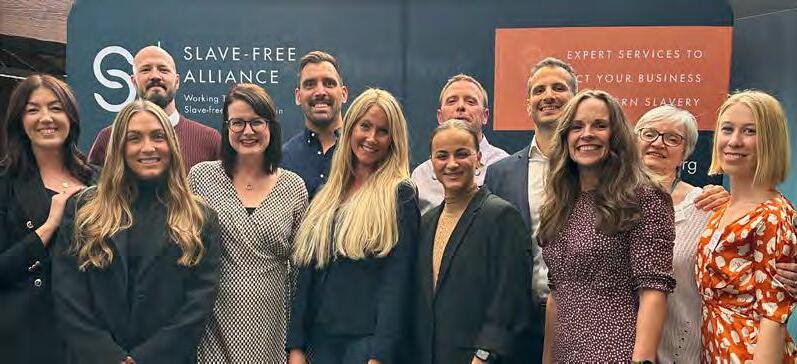
Also attending were representatives from Norway-based technology firm Dataunitor, with whom Slave-Free Alliance is working to deliver Supply Chain Continuous Compliance (SC3) technology which will provide services for modern slavery risk management and due diligence.
Jonathan Dobson, Sustainability Strategy Manager at United Utilities, said: “Really insightful, inspirational and educational session today at the Slave-Free Alliance seminar. Great to hear from others working to address one of the biggest social issues facing companies.”
Marc Stanton, SFA Director, said: “We support organisations to develop an action plan and use consultancy, training and technology to mature their initiatives. From due diligence, risk management and site assessments to incident escalation pathways, we take a partnership approach to drive improvements. We are proud of all organisations who have joined our membership programme and who are addressing the risk of modern slavery in their organisations and supply chains.”
Enrique Restoy, who oversees Hope for Justice’s international programmes, said: “SFA contributes to the efforts of Hope for Justice around the world to end modern slavery. It was a pleasure to join the conference in Manchester and to learn from so many inspiring business leaders.”
More conferences, events and webinars are planned for 2023 and beyond.
39
As I reflect on the year just passed, I am incredibly proud of the achievements of Hope for Justice across all four pillars of its work: preventing exploitation, rescuing victims, restoring lives, and reforming society.
Our monitoring and evaluation data shows that the overall reach of the programmatic work was its highest ever, at more than 200,000 people.
What is even more impressive is that this has happened at a time of global economic turmoil and inflation, when the entire charitable sector is feeling the impacts of rising costs and falling income. Hope for Justice has been no exception.
STATEMENT ROBERT CAMP
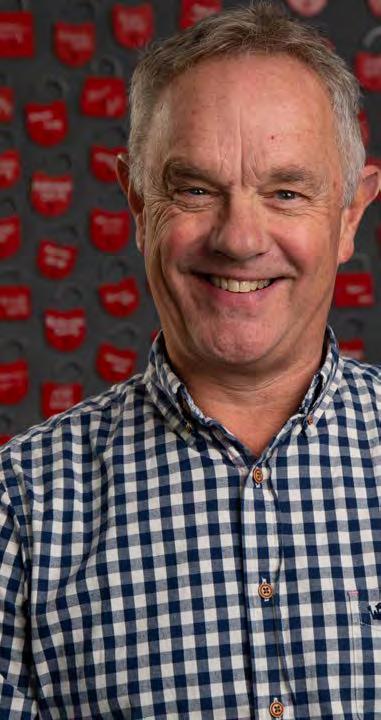
I want to pay tribute to the work of the charity’s Executive Team during this period. They have acted with a sense of togetherness and with the highest professional standards to make necessary adaptations to our operations and programmes in order to improve the impact and efficiency of what we do for beneficiaries in this difficult financial climate. They have put in a huge amount of time and effort for the good of the organisation and I share with them a real excitement about the future of Hope for Justice.
We have seen changes on the Board too, with some longstanding trustees coming to the end of their terms and stepping down, and some excellent, experienced new board members taking their places. I am so pleased to welcome them and am pleased to see the Board becoming more diverse in a range of ways. As part of our long-term strategy for governance and oversight, we have formed a new U.S. Board with some exciting and ambitious plans for the future.
Hope for Justice has shown itself on multiple occasions this year to be among the world’s leading anti-trafficking organisations. We see this not just in terms of the number of people we are reaching directly, but also through the platforms on which we are being invited to speak and to share; the influential people inviting us into the rooms where key decisions are being made; and the legislation and policy that bears our influence and imprint. We see it too in the collaborations with leaders and pioneers in anti-trafficking and also the worlds of supply chains, procurement, technology and international development. These interlinked areas will all be part of the eventual elimination of trafficking from our world.
We acknowledge that no single organisation could ever do this alone or in silo. As the U.S. Secretary of State, Antony Blinken, said at the launch of the latest Trafficking in Persons Report, achieving this goal of eliminating human trafficking is going to take a “global coalition, one that cuts across government, business, and civil society” and one informed by the voices of survivors.
At each Board meeting, we hear at least one story of impact and a life changed through our work. It is never anything less than incredibly moving, but also encouraging. When we hear individual stories of a life broken apart by trafficking and then restored through the efforts of our teams and the generosity of our donors, we remember the thousands more lives also being touched by this work.
It inspires us to redouble our efforts and to never stop striving to live in a world free from slavery.
Robert Camp Chair, Hope for Justice
40
CLOSING
‘We will never stop striving to live in a world free from slavery’
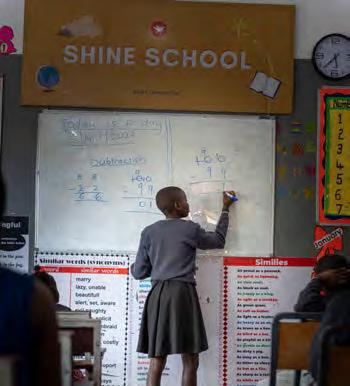
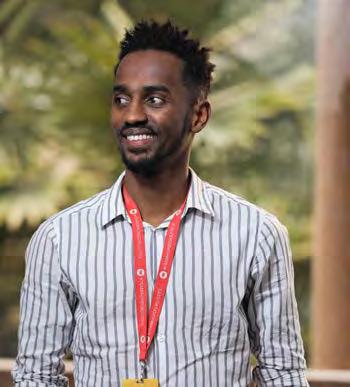
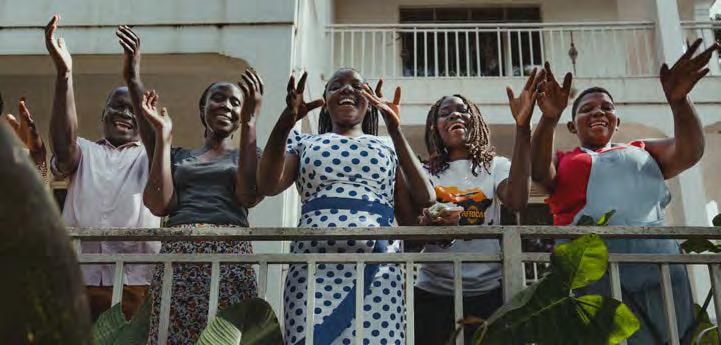
WILL BE THE GENERATION TO END
TRAFFICKING Hope for Justice (Australia) Registered office: 477 Boundary Street, Spring Hill QLD 4000 info.au@hopeforjustice.org Hope for Justice (Australia) Ltd, ABN 28 639 382 782, is a registered charity with the Australian Charities and Not-for-profits Commission (ACNC) and granted public benevolent institution (PBI) status. Donations of $2 or more are fully tax deductible in Australia as allowed by law.
WE
HUMAN
EXTREME CHALLENGE: DRAKENSBERG
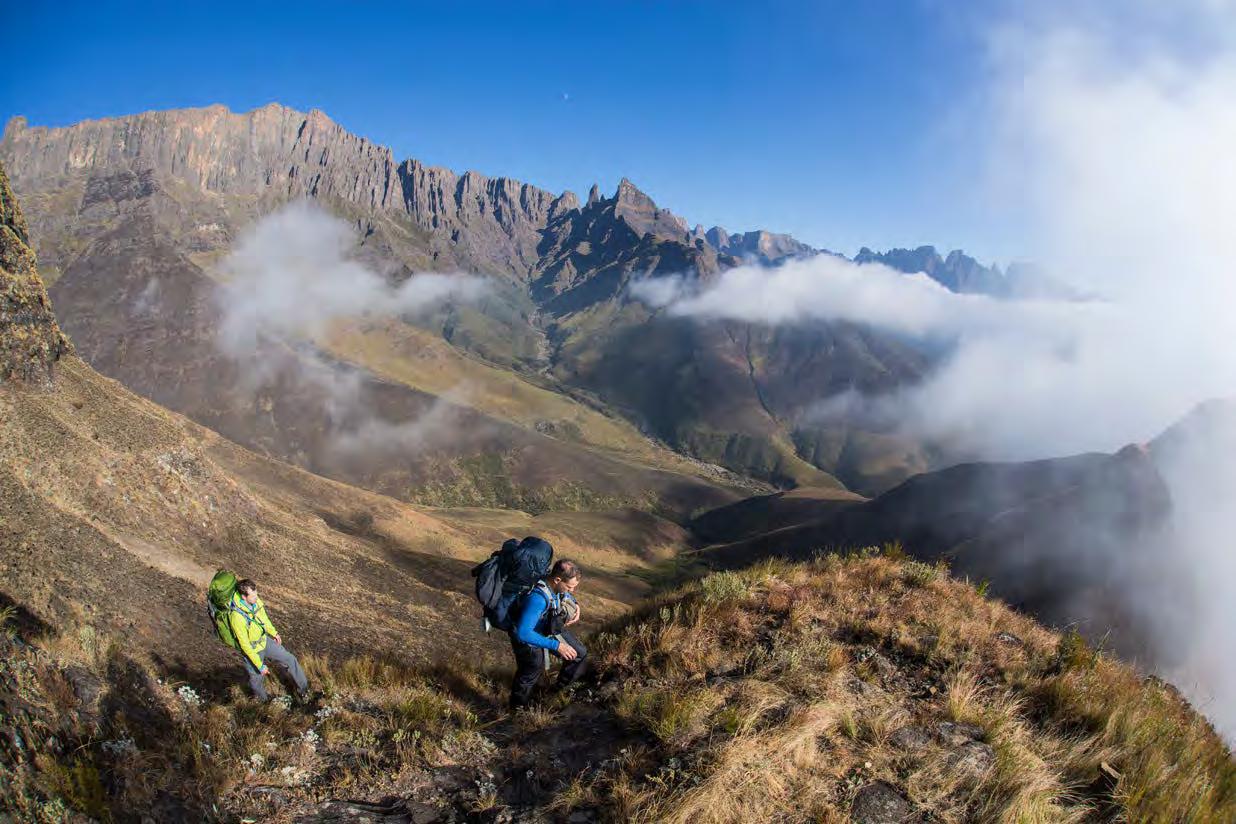
OCT 6TH - 14TH

FIND OUT MORE:











































































































